Wonderful Malaysia
- Travel community
- Attractions
- Hotel Reviews
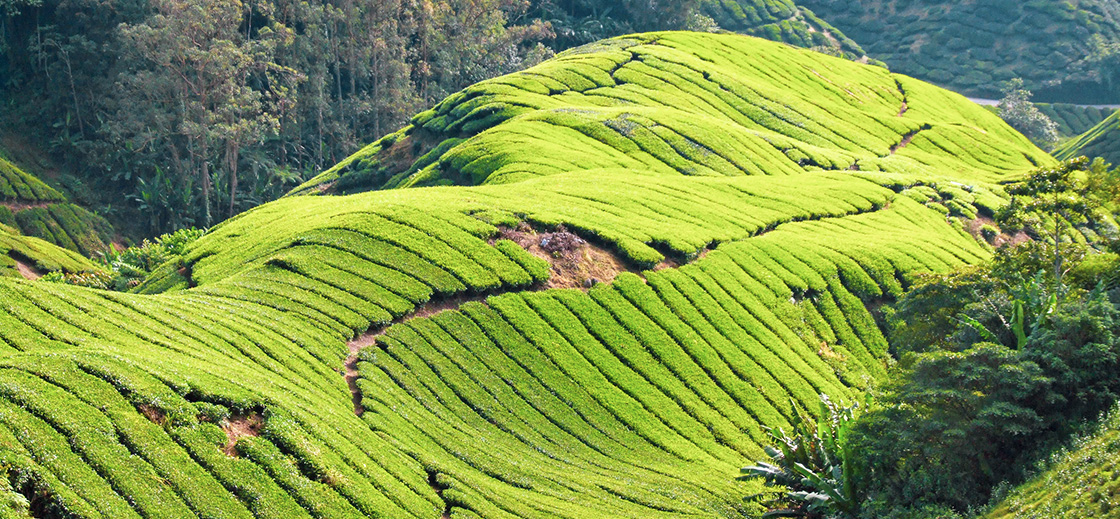

Beautiful tea fields in Cameron Highlands
Cameron Highlands is the place to watch stunning tea fields. Boh Tea Plantation is the biggest in the country and the views over there are to die for. Enjoy a cup of tea and a freshly baked scone at the plantation restaurant, while enjoying magnificent panoramas.
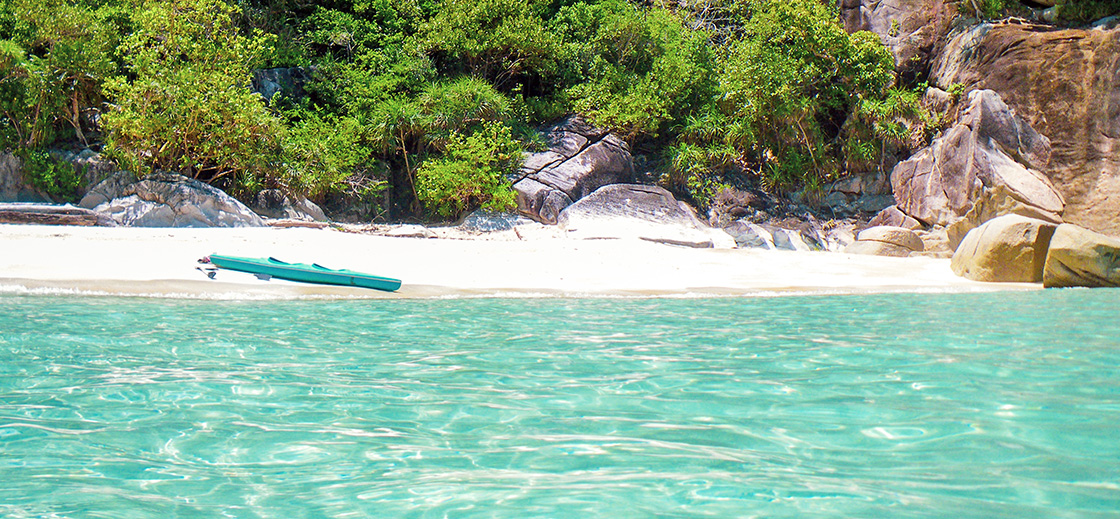
Crystal clear water at Perhentian Island
Perhentian Island is one of Malaysia's best kept secrets. Actually consisting of two small islands, both offer similar accommodation and both are surrounded by crystal clear sea water, with perfect scuba diving and snorkeling conditions. Go enjoy island life to the fullest!
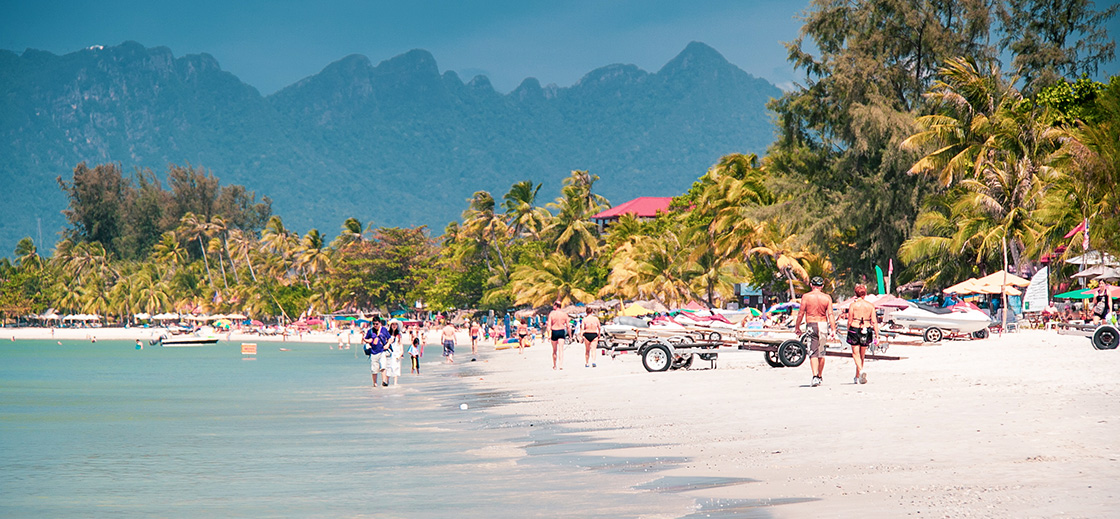
Perfect beach holiday at Langkawi Island
Langkawi Island has everything you need for the ultimate beach holiday. White powdery beaches, a wide range of hotels and resorts, delicious food and a huge amount of sights and attractions. You can easily spend a whole week and still long for more.
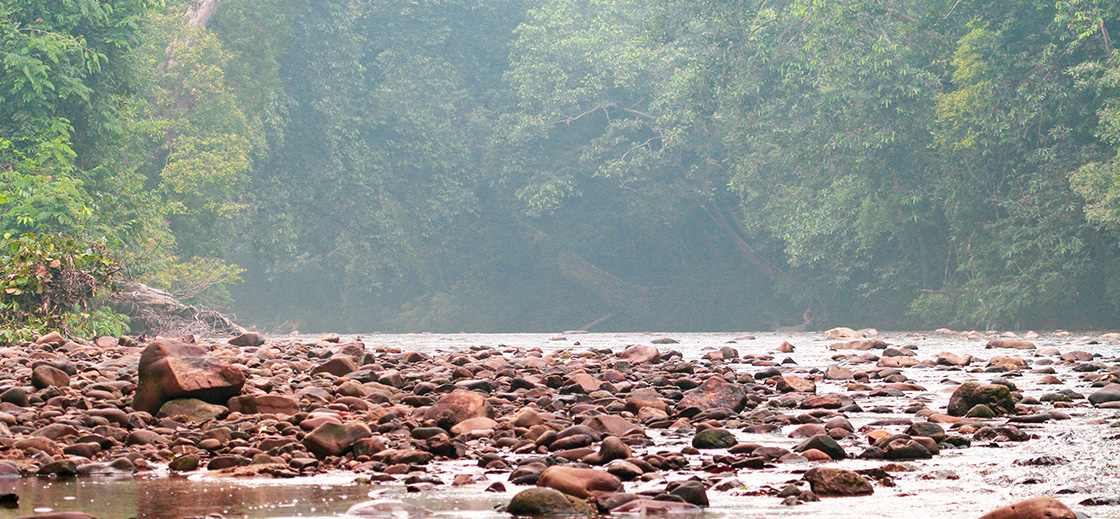
Jungle adventures at Taman Negara
Taman Negara is one of the oldest primary rainforests in the world and due to its close proximity to Malaysia's capital Kuala Lumpur, travelers can reach this pristine jungle fairly easily. Highlights consists of jungle hikes, a canopy walk, night safari's and river cruises.
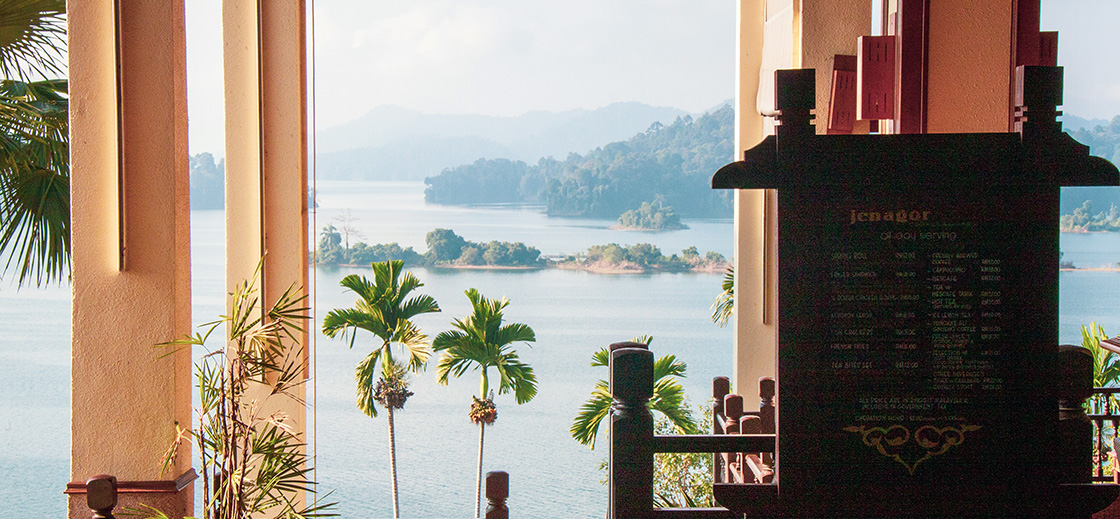
Boat exploration at Lake Kenyir
Lake Kenyir the biggest man made lake system in Malaysia. Over the years it has evolved into a unique ecosystem with many sights and even a chance to spot wildlife like monkeys, elephants, hornbills and much more. Some even spotted the elusive black panther along the shores.
About Malaysia
- Climate & Weather
- Festivities
- Flora & Fauna
- Hygiene & Healthcare
- Laws & rules
- Living & Working
- Map of Malaysia
- Medical Tourism
- Quick Facts
- Restaurants & Dining
Travel information
- Airline Tickets
- First visit to Malaysia
- Hotels & flight tickets
- Top10 Highlights
- Travel advice
- Travel costs
- Travel themes
- Travel in Malaysia
- Travel to Malaysia
- Visa information
About this website
- Work for us
Peninsular East Coast
- Lang Tengah
Peninsular West Coast
- Pulau Payar
- Layang Layang
- Tunku Abdul Rahman Park
- Johor Bahru
- Kuala Terengganu
- Kuala Lumpur
- Kota Kinabalu
Places to visit
- Cameron Highlands
- Danum Valley
- Elephant Sanctuaries
- Endou Rompin National Park
- Genting Highlands
- Gomantong Caves
- Kinabatangan River
- Kuala Selangor Fireflies
- Lake Kenyir
- Mount Kinabalu
- Mulu National Park
- Niah Caves Park
- Orangutan Sanctuaries
- Port Dickson
- Royal Belum State Park
- Taman Negara
- Turtle Island
- Bako National Park
Important Laws and Legal Information for Travelers to Malaysia
Malaysia is a hotbed for tourists. It’s a beautiful place to visit with gorgeous beaches, fantastic weather, delicious food and an amazing culture. It is definitely a place where you could make memories that you would cherish for a lifetime. Of course, if you are a tourist to the country, you want to be aware of the dos and don’ts of what you can do and what you should avoid. No one wants to have their trip ruined by paying a heavy fine, or worse, ending up in jail, so you should be aware of the fun things to do in Malaysia, but you should also be aware of important legal information as well.
Before you start reading this article, we’d like you to inform you about the fact that Malaysia relies heavily on tourism as it is the third biggest contributor to Malaysia’s GDP. Some previous incidents involving tourists made world headlines and you can be sure Malaysia wants to avoid this kind of bad PR at all costs. Standard objective would always be to settle things in the least conspicuous way. Holidaying in Malaysia can be enjoyed without ever having to worry yourself about the laws and rules you’ll read about below.
How to Get into Malaysia
Citizens of the vast majority of countries are welcome to come to Malaysia, and have been doing so for many years. It has become one of the most popular tourist destinations on the planet, and part of the reason for this is that it is very easy to visit this beautiful Southeast Asian country. To gain access, all you need is a tourist visa. Most foreign travelers will get one upon arrival (in most cases with a validity of 90 days), some need to apply for a visa before their trip. Check the rules that apply to travelers from your country beforehand to avoid trouble once you arrive in Malaysia.
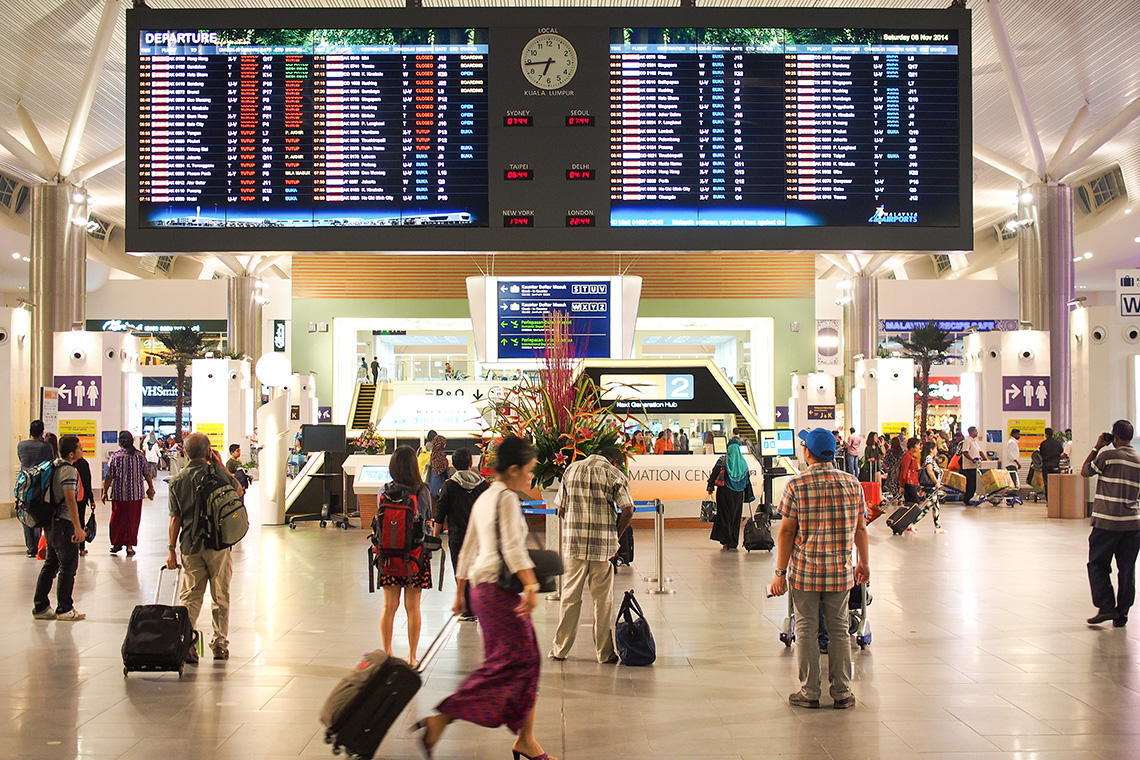
In most cases, you may be able to apply for a tourist visa once you arrive in the country, but it is probably better to avoid any hassle by being proactive. Rules may differ for per country. For example, Indian travelers need to apply for an eNTRI beforehand. Travelers from certain other countries, like China, Sri Lanka etc, need to apply for an e-Visa.
Great Attractions for All
There are incredible attractions in Malaysia , places that will leave you breathless. For example, the Beautiful tea fields in Cameron Highlands are absolutely gorgeous. The design and maintenance have made this a spot you will not want to miss.
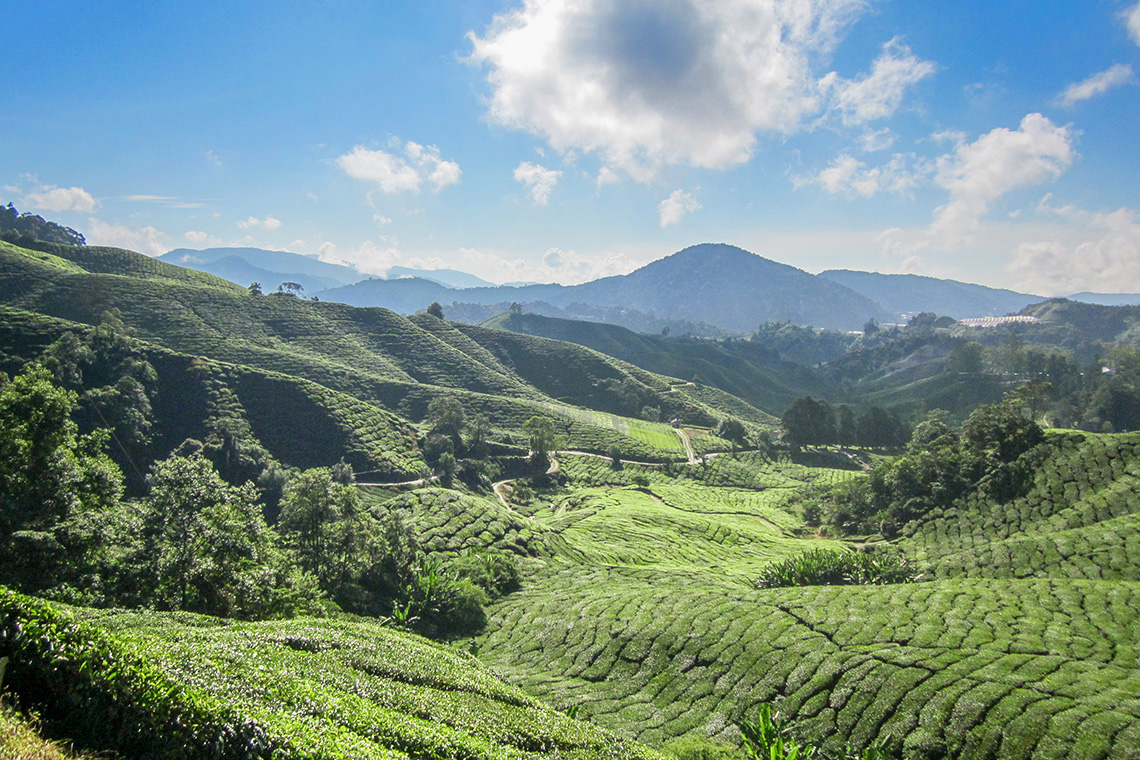
Of course, what brings many to the country are the incredible beaches and beautiful clear water. If you want to swim, scuba dive, take a boat ride, fish, or just lay out on the beach, you will find this country quite hospitable. The Perfect beach holiday at Langkawi Island , Crystal clear water at Perhentian Island , and Jungle adventures at Taman Negara are perfect for any beach or water activity.
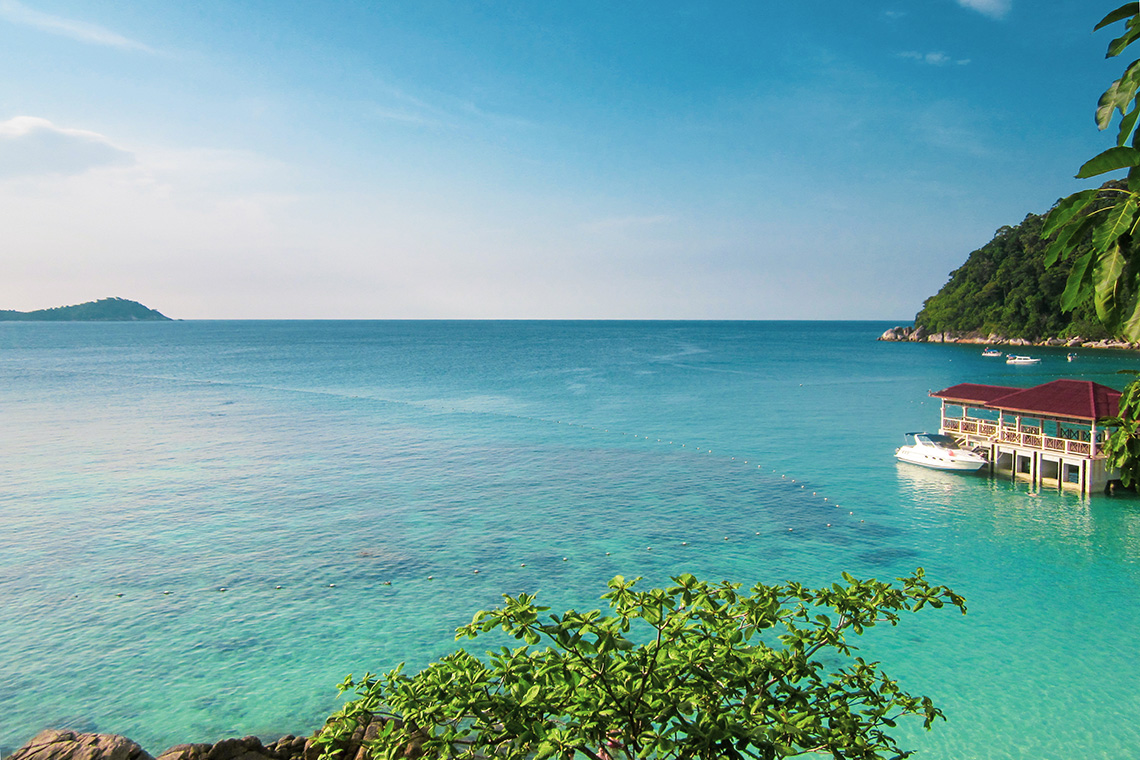
Malaysia is the melting pot of a few different cultures, including Indian, Chinese, and European, so there is great culture and history. You will find fantastic artifacts, art, and exhibits at museums, and the food is like no other on the planet (simply divine!).
Non-Muslims
Freedom to follow one’s own religion is protected under the country’s constitution, but that is not adhered to in practice. Around 30% of the population is non-Muslim, meaning that many of the laws that have been written in accordance with Sharia law do in fact not completely apply to them. But this doesn’t mean they are allowed to just ignore Sharia law. Minorities have adapted perfectly well to basically live a carefree life in the country, without risking repercussions from not obeying religious law. Actually, you’ll notice most minorities live in more urban areas, often the more populous regions along peninsula Malaysia’s west coast. Here they can live their lives without too much interference by the other population groups or by the religious police. For example, local (religious) authorities have a much tighter grip on community in states like Kelantan and Terengganu.
What tourists may find is that they can come in conflict with laws related to blasphemy, which prohibits any conduct or word that insults a religious group or belief. You can still enjoy visiting Malaysia and have a great time there, just be aware of the beliefs of the vast majority of the citizens of the country and be respectful.
LGBT Rights
Many couples would consider Malaysia the perfect honeymoon or romantic getaway. But one should be aware that not all personal choices are accepted in the country. That is especially true for gay, lesbian, and transgender couples.
Because Malaysia is predominantly Muslim, the country follows Sharia law in most cases (Sharia law is a separate law altogether from the Malaysian legal system). Though Sharia law primarily applies to Muslims, the laws regarding everything LGBTQ apply to everyone, even western tourists. You should be aware that many of the romantic activities you are able to enjoy in your own country are likely illegal in Malaysia, or at least frowned upon.
That said, reality is that gay couples can have a fabulous holiday in Malaysia without constantly having to worry about its ‘religious police’. Many of our Malaysian gay friends live a pleasant life in Malaysia, obviously they’re facing challenges, but overall quality of life is quite good. Compared to many western countries however, Malaysia does not offer the same freedom in terms of life choices. Compared to heterosexual couples, there’s no carefree living for gays in Malaysia.
Gay couples visiting Malaysia often act as ‘good friends’ in public. Perhaps not the most fun way to enjoy a holiday, but the vibe is often much more relaxed when staying at one of the better resorts on the islands or along coastal areas. In buzzing cities like KL, people aren’t too occupied with how others behave or appear.
Enjoying Your Night Out
You should be aware that there are many forms of conduct that can get you into trouble in Malaysia. One of the most common is drinking, excessive drinking to be more specific. Sharia law prohibits the consumption of alcohol, but these laws apply to Muslims only (more specifically, local Malay Muslims or people resembling Malay Muslims like travelers from nearby countries). There are many bars and clubs where tourists (and expatriates) can go to have a drink. Bigger cities like KL and Georgetown have a vibrant night-life scene with big dance events, concerts at small and big venues, life music and the typical bars with huge buckets full of beers and such. A simple rule applies, don’t get too drunk and refrain from disorderly behavior.
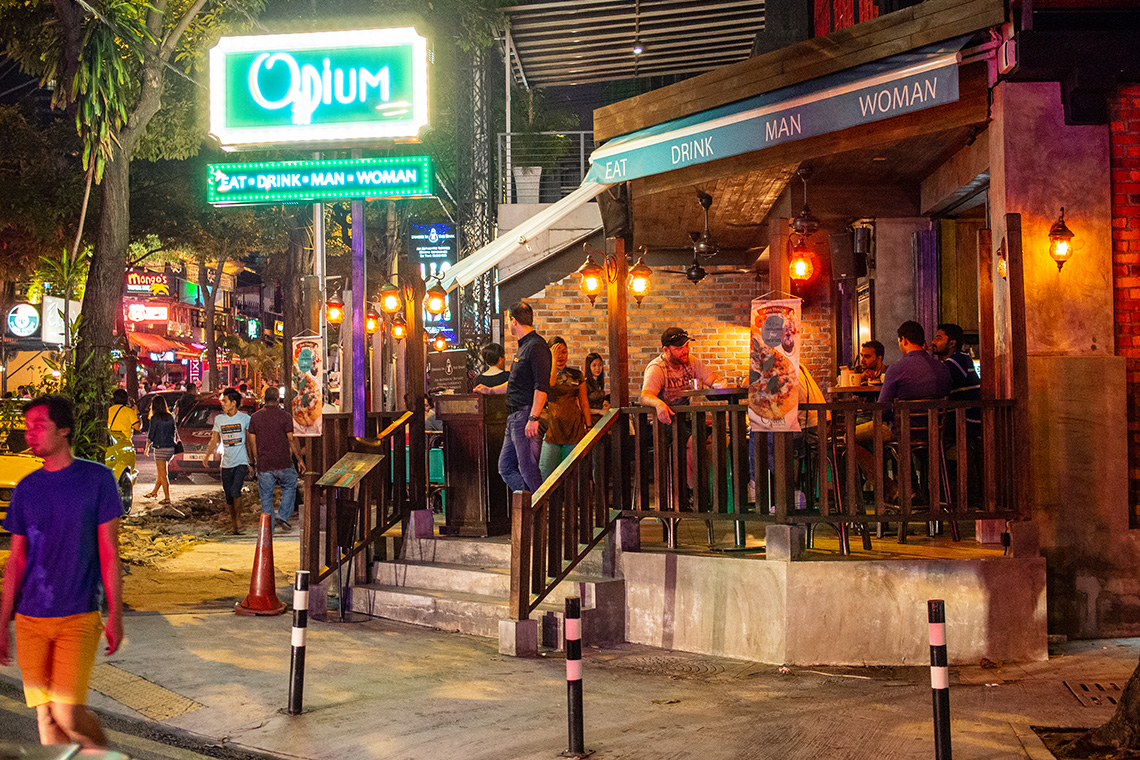
The 1955 act that prohibited foul language also bars public drunkenness anywhere in the vicinity of a courthouse or place of worship. You will find many places of worship throughout the country, so it can be quite easy to violate the law. It is ok to drink – just be moderate about it.
As part of your night out, keep in mind that oral sex on a man is still considered a crime regardless of whether it is a man or woman who committed the act. This law is taken seriously, as the punishment is a maximum of 20 years in prison. Both the person giving and receiving can go to jail.
One other thing to keep in mind while you are out is that you need to be respectful and keep the noise down. Making too much noise is seen as a public nuisance crime and you can receive a stiff penalty. Noise does not have to be verbal either, banging a drum or blowing a horn could get you into trouble as well.
Gambling in Malaysia
For those who enjoy playing slots, blackjack, or other casino-style games, there is a lot to enjoy in Malaysia. They have incredible casinos available at the mountainous Genting Highlands, together with a plethora of online options. If you fancy some fun at one of many online casinos, you can play your favorite games anywhere within the country, according to this international source . It also offers a comprehensive list of all options to fulfill all your online gaming needs.
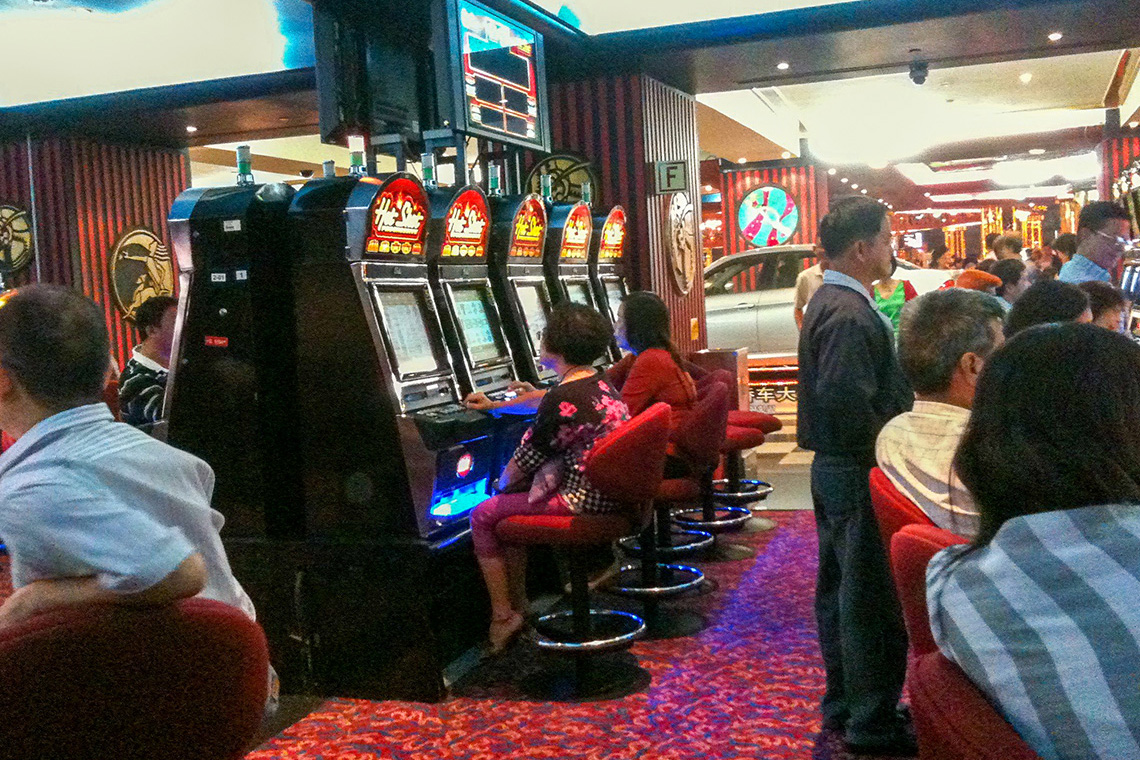
To keep yourself out of trouble, you should be aware that online gambling is technically illegal in Malaysia. Right now, it is illegal to host online casino sites within the country’s borders, but laws do not specifically prohibit gambling online. While you may be able to gain access to a site hosted in a neighboring country, it doesn’t mean that you should.
While casinos are legal to operate in Malaysia, Muslims are barred from using the facilities. This is a very interesting dynamic considering that almost 70% of the people in the country fall in that category. Among the visitors of casinos are mostly local Chinese-Malaysians, Chinese tourists, Singaporeans and the occasional western tourist.

Over the years Genting Highlands evolved into one gigantic entertainment hub that comprises of indoor and outdoor theme parks, cinemas, bowling alleys, huge Vegas like shows and a colossal shopping mall stretching throughout the resort. Because of this it is highly popular among the Malay population, even though they cannot participate in any of the gambling options that is provided here as well. Instead, they head out there with families for a weekend full of fun. Due to its close proximity to the capital of Kuala Lumpur, many book a room at one of many amazing hotels to spend several days in this great place.
While at the Beach
You need to be careful with your conduct that beach. The same behaviors that apply while you are out would apply at the beach as well, so don’t be drunk, don’t make too much noise, and avoid having sex. In general, Malaysians are quite conservative when it comes to how to dress and how to behave in public.
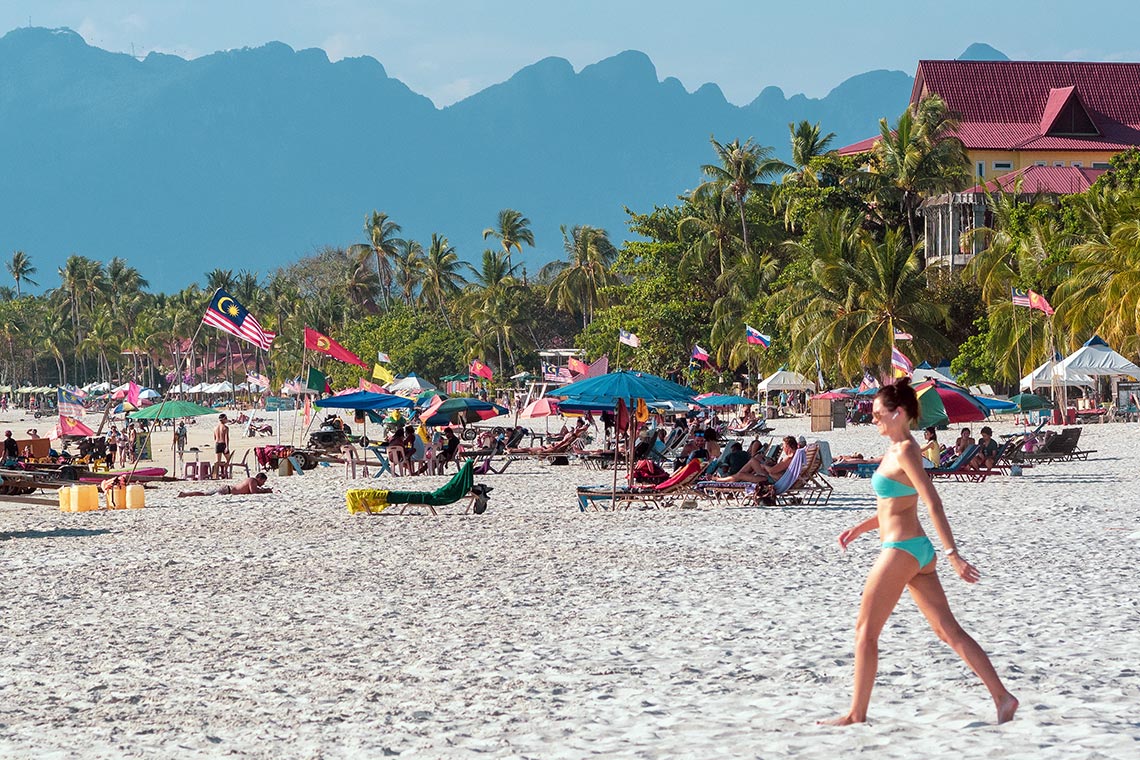
You also need to keep your bathing suit on, even on the most secluded beaches. In many countries, women like to go to the beach and at least take off their tops. This is a crime in Malaysia. It could lead to you going to jail and you can be fined as well. So, keep it on in public.
Public Indecency and Public Display of Affection
Malaysia has some strict rules in place for its inhabitants, and most also apply to tourists. Obviously, all forms of public indecency are strictly forbidden and punishable by law. Do not engage in public sex acts ever, it could open up a world of trouble.
But there’s also a much more subtle set of rules in place, related to all forms of public affection. Kissing in public is frowned upon. It will not lead to fines and such, but you may receive some glances. You will probably never ever see a local couple kiss in public. However, cuddling or holding hands is fine, occasionally you’ll even see male friends (mostly from the Indian demographic, but often Malays as well) holding hands when walking.
Lately, some rules have been introduced to make sure Muslim non-married local couples are not able to stay in a hotel room in Malaysia. Immediately after this set of rules we received questions from our readers if these rules also apply to them. Fortunately, the answer is No, unmarried foreign couples are just as welcome into Malaysia as every other couple.
Say No to Drugs
Drugs are strongly prohibited in Malaysia. Once again, because of the influence of Islam on the laws of the country, any type of illegal substance that is used is a serious crime. There has been talk by government officials of decriminalizing those who use small amounts, instead choosing to provide them with treatment. However, those who are using harder drugs or who are involved in the selling of drugs are looking at serious repercussions for doing so.
There is a rising addiction problem in Malaysia and they are trying to curb this by getting people help. However, tourists using drugs may be viewed as a source of the problem and could be dealt with quite severely. NEVER EVER USE DRUGS IN MALAYSIA!
Do Not Overstay (Your Welcome)!
Travelers that arrive in Malaysia receive a passport stamp which allows them to stay in the country for a certain period of time, depending on your origin. Most European travelers for example are allowed up to 90 days on a so-called Tourist Visa, which means that they must leave the country (or travel elsewhere) before these 90 days are up.
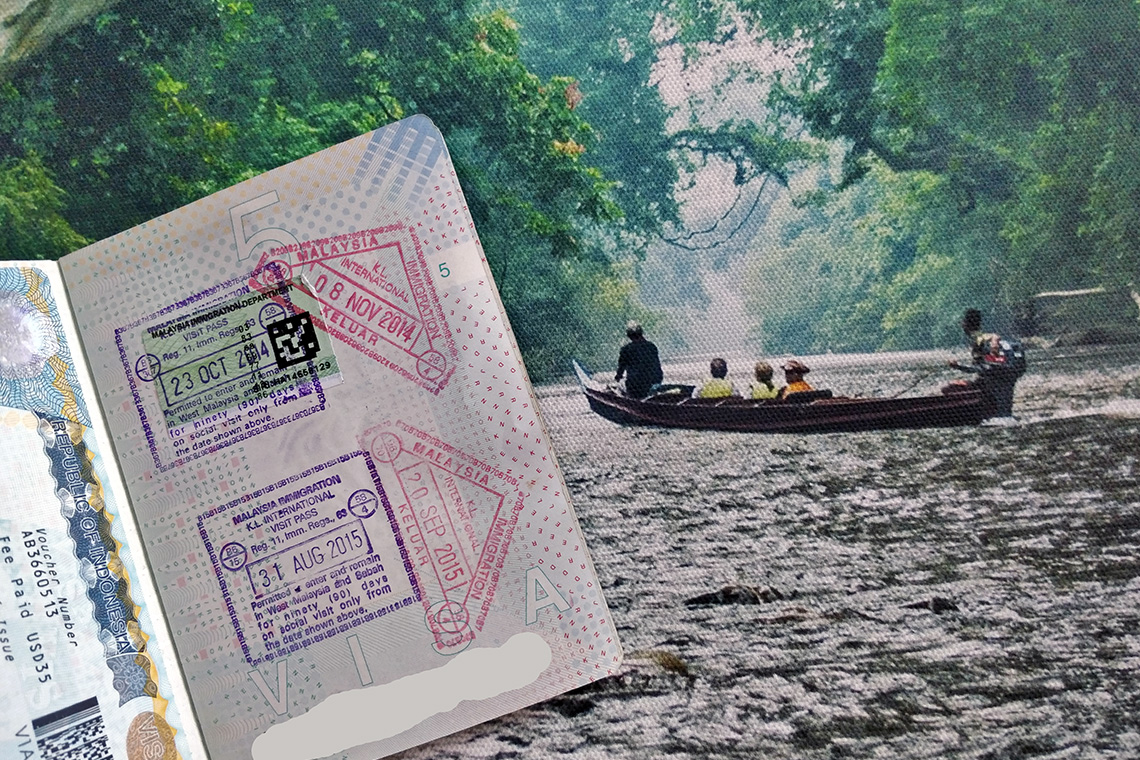
It is very important to not overstay. It could mean you get a fine or worse and at least a prohibition of entering the country for several years.
Do Not Consider a Bribe
Bribing is against the law. Never try to settle an issue by offering a bribe. Times of bribing local enforcement officers are long gone. Do not suggest it, do not try to be subtle about it.
Also, if you do encounter a situation where you feel a bribe is suggested, please decline and always ask for the ‘proper way’ to settle. This could mean a higher fine or more hassle, but it also means things will not escalate further or spiral out of control.
Avoid Traffic Incidents
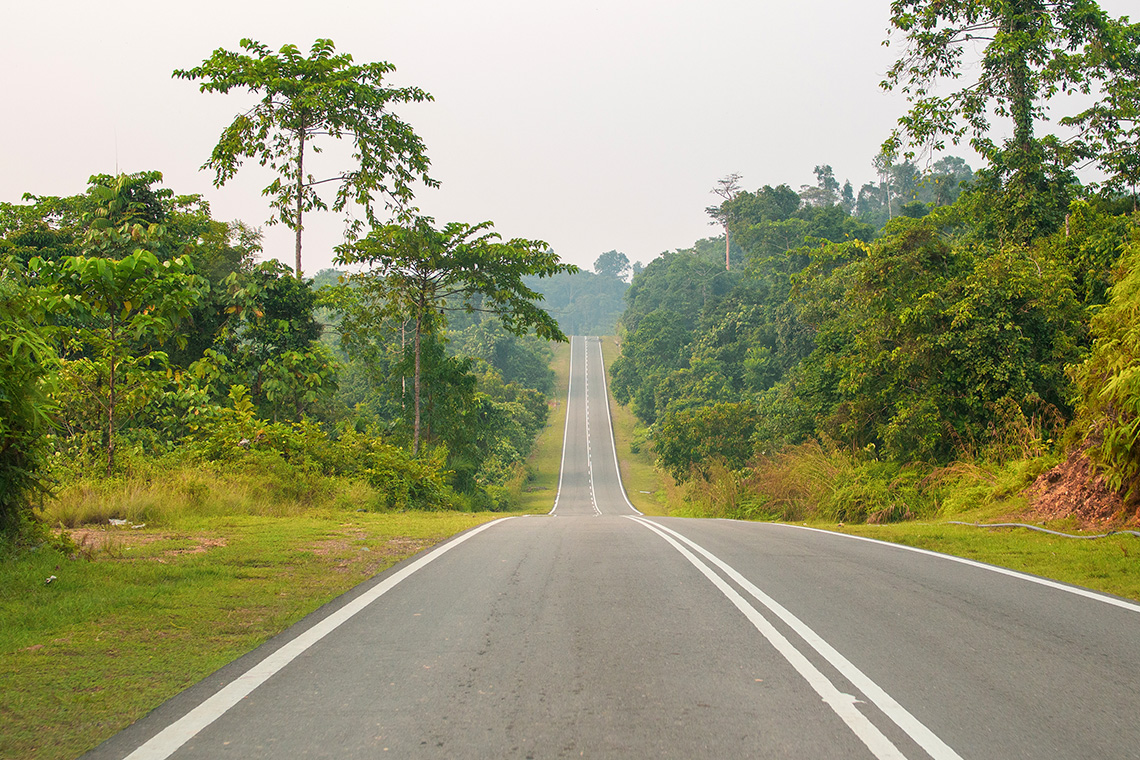
Usually, when there are traffic checks, foreign travelers are allowed to pass through without a question. Most of these random checks are purely focused on local inhabitants, and often in crowded/urban areas (as the image above suggests, driving through rural Malaysia can be quite lonely at times). However, if you are caught speeding, ignoring traffic lights, driving into traffic on a one-way street, or worse, drunk driving or involved in an accident, you can look forward to paying hefty fines.
This goes for scooter rental as well. Be aware that you are often only allowed to rent a scooter (actually a very fast motorbike) if you carry a motorbike license. A typical driving license is not sufficient. Make sure you inquire upfront about rules that apply. Langkawi for example is notorious for traffic checks (with main focus on tourists).
Different States, Different Laws
Malaysia has many different states, each has their own local government and each enforces laws their own way. Some states, for example Kelantan and Terengganu, are more strict than other states. Here Sharia law is more dominant. During our first few trips to these states, many many years ago, alcohol wasn’t even available in international hotel chains. Nowadays more Chinese-Malaysians have settled here and those that run an F&B establishment are also allowed to pour alcohol. If a place in these states does sell alcoholic drinks, you’ll know it and you do not have to ask for it specifically. When in doubt, assume they do not sell alcohol.
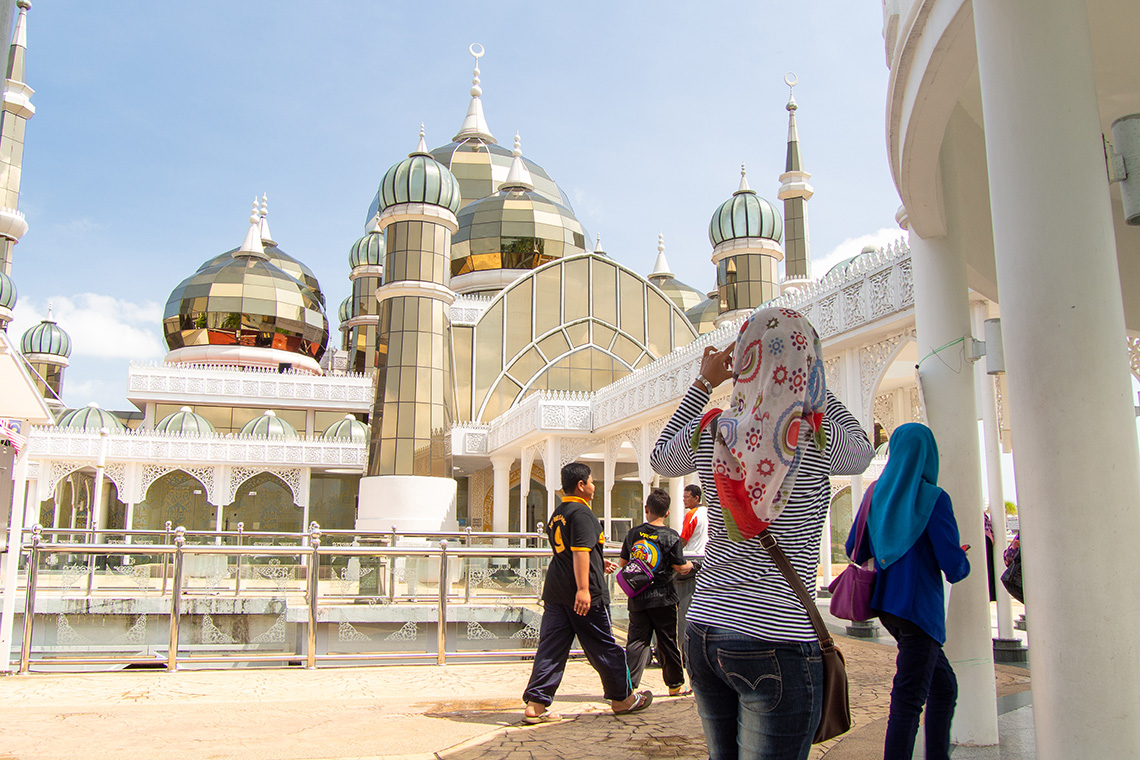
Religious sites always have a certain set of rules to abide to, usually clearly visible on a sign at the entrance. Examples are, no shoes inside the premises, do not show too much bare skin, no shorts or tank-tops etc.
The Island of Penang, the State of Selangor and capital city Kuala Lumpur have the most liberal stance towards consumption of alcoholic beverages. Think of bars with hundreds of different types of beers, vast collections of whisky’s and more. In Kuala Lumpur, there are several districts for a great night out, for example Changkat Bukit Bintang in KLCC, Bangsar and Damansara (just outside of KL in the state of Selangor).
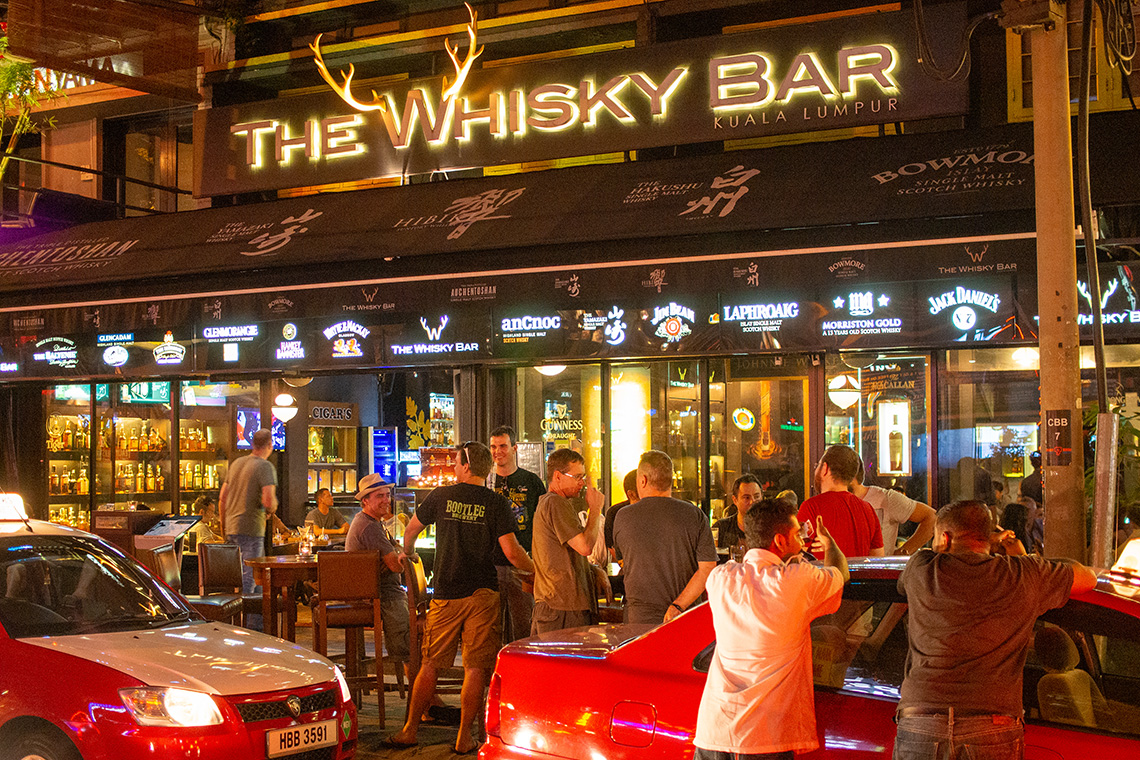
Stay Away from Certain Regions
This will probably not get you in trouble with local law, but they do carry certain risks. For example, you have to be cautious in Northern parts of the peninsula, specifically the border regions to Thailand. Some parts of Eastern Sabah are recommended to avoid as well. Though chances you run into issues are slim, there’s also the matter of (health) insurance coverage. If you run into troubles in these regions, you might risk your insurance not willing to cover expenses.
Dual Nationality is a No Go
Dual citizenship is not recognized in Malaysia. Make sure you travel with a single passport only. If Immigration discovers you carry dual nationality, you may need to renounce one at the spot.
Eating During Ramadan
Foreign travelers (non-Muslims) are allowed to eat during the holy month of Ramadan. It is however more appropriate to refrain from eating, drinking or smoking in public during the day, especially around people that are fasting. Luckily the sun sets early in Malaysia, so around 7.30pm tops most Muslims are happily enjoying their meal.
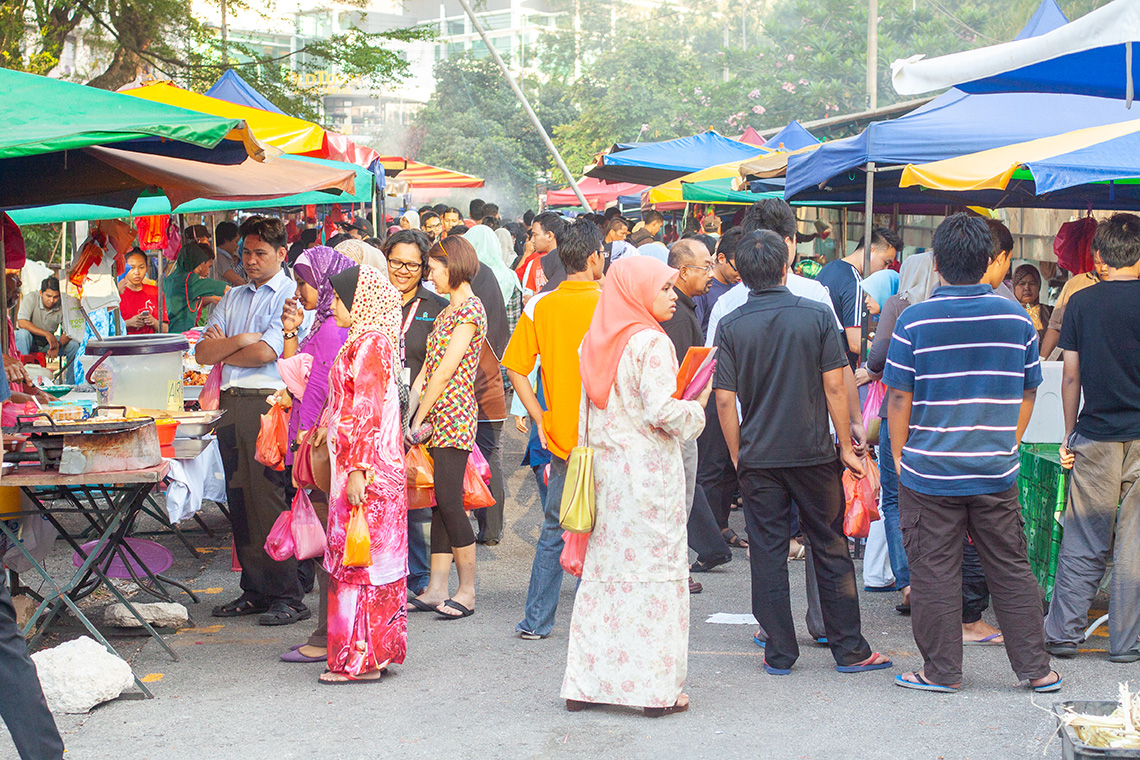
Most popular tourist areas, including all bigger cities, have ample F&B establishments where you can eat during the day without any issues. Here local Chinese-Malaysian citizens have their dinner as they do not adhere to the rules that apply during Ramadan. All Chinese and western restaurants will be open during day-time so it is always easy to find a place to eat. In some regions, like the previously mentioned states of Kelantan and Terengganu, you are best off heading to one of the more luxurious hotels and resorts for a nice meal during the day. You’ll find that most local shops (are run by Malaysians) are closed during the day during Ramadan.
You Will Have a Great Time
The reality is that the vast majority of these are commonsense things to do. You should not be in any kind of trouble if you are respectful and keep your enjoyment to a moderate level. There is a lot to do and you will find plenty of things to make this a destination you will never forget.
You just need to make sure that you are respectful to Muslims and to the Islamic faith as a whole. Do this, and you will have the time of your life.
- Country information
Subscribe now to never miss a post! Subscribe to our email updates or join us on our Facebook page , right now! Travel related questions can be asked in our Telegram channel or in our Travel community .
Tagging: Important laws , Laws , Laws for travelers , Legal information , Malaysia , Malaysian laws , Regulations
- Introducing Tony Fernandes: Mr. Air Asia
More related articles
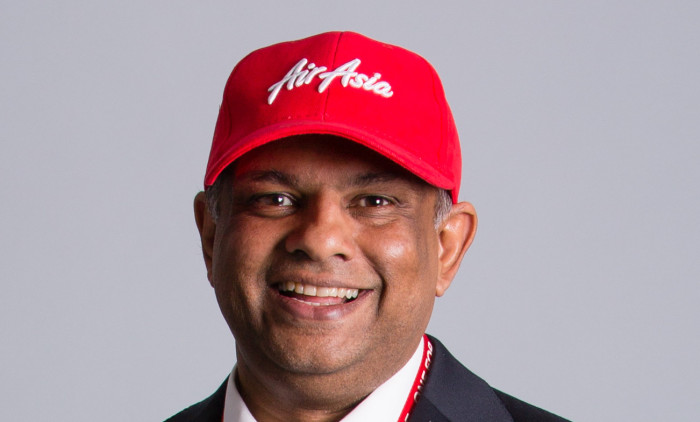
5 comments on Important Laws and Legal Information for Travelers to Malaysia
We have extend this offer for you to provide us with a price quote for the item listed below :
Canon EOS Rebel T5 DSLR/1200D Quantities: 25
Payment:Net 30 Days
CONFIDENTIALITY NOTICE: The materials contained in this electronic transmission are private and confidential and are the property of the sender. The information contained in the material is privileged and is intended only for the use of the individual(s) or entity(ies) named above. If you are not the intended recipient, be advised that any unauthorised disclosure, copying, distribution or the taking of any action in reliance on the contents of this electronically transmitted information is strictly prohibited. If you have received this electronic transmission in error, please immediately notify the sender and destroy all copies of the original message..
Esther Schneider Director, Purchasing DuPont de Nemours, Inc.
Good Morning . My name is Mary Sharp https://www.facebook.com/profile.php?id=100053098970166 , and I would like to contribute an article about Celebrities to your website.The title will be Top 10 Fashion trends in pandemic I think we might be a good fit for your website and thought I’d reach out. Let me know what you think so we could discuss the details Best Regards Mary
Good Evening
We are reaching out to you to see whether you would be interested in featuring your vape/CBD brand on Vape Life Mag, a lifestyle magazine covering the latest vape and CBD product reviews, industry news and guides.
Vape Life Mag presently receives in excess of 50,000 highly-targeted monthly visitors from the United States and the United Kingdom. We have managed to achieve this by running a highly successful vape and CBD blog where we regularly publish quality content.
We can feature your brand by publishing your guest post on our magazine along with a do follow permanent backlink. This will help you to build your brand, site traffic and natural search engine rankings.
This is an excellent opportunity to kick-start your digital marketing in the face of the fierce competition and the advertising restrictions facing the vape and CBD industries.
We look forward to hearing from you.
Kind regards
Vape Life Mag Editorial Team
I am a freelancer VAPE and CBD backlink builder. I am freelancing on FIVERR. Take a look at my services and let me know if I can help you. I would like to offer you a free trial for one month. If you see results, you can order. This is how confident I am that you will love my service.
https://www.fiverr.com/mosora
I trust this message finds you thriving. My name is John Williams, and I’m representing Starlion Distribution, a premier provider of food service supplies in Miami, FL.
I’m reaching out to you because I understand the challenges that food owners face in balancing quality and costs. I’m thrilled to introduce you to our company and the potential to enhance your bottom line by saving on your current disposable supplies.
We specialize in offering competitive pricing on a wide array of food service essentials, from disposables to kitchen equipment. Whether it’s napkins, utensils, containers, or any other supplies, we invite you to share your invoices. We’re confident that we can provide you with better prices without compromising on quality.
At Starlion Distribution, customer satisfaction is our top priority, and we strive to cultivate lasting partnerships with our clients. Our dedicated team is committed to delivering personalized service tailored to your unique needs.
Would you be open to exploring how we can streamline your supply chain and help you save money? Please don’t hesitate to reach out to me directly with any inquiries or to discuss your requirements further.
Thank you for considering Starlion Distribution. We eagerly anticipate the opportunity to serve you and your food business.
Best regards, John
[email protected]
Leave a reply
Free ebook top 100 tips malaysia.
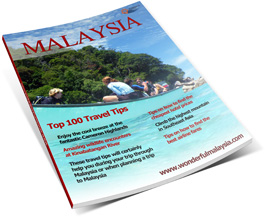
Learn all there is to know about Malaysia with our Wonderful Malaysia Top 100 Tips eBook! Get your FREE copy of our eBook by signing up.

- A Land of Opportunities
- Sustainability Agenda
- Investment Statistics
- MIDA Insights
- Building Technology
- Life Sciences & Medical Technology
- Chemicals & Advanced Materials
- Machinery & Metal
- Electrical & Electronics
- Paper, Printing and Publishing
- Food Technology
- Transportation Technology
- Wood-Based and Furniture
- Business Services
- Logistics Services
- Education Services
- Oil & Gas
- Green Technology
- Healthcare Services
- Regional Establishment
- Hospitality (Hotels & Tourism)
- Research & Development (R&D)
- Other Services
- Investor Highlights
- Setting Up Business
- Business Facilitation
- Annual Media Conference (AMC)
- Announcement/ Media Release
- e-Newsletter
- Featured Articles
- Investment News
- Media Gallery
- Publications
- Advertise with Us
- Our Principles
- Board Members
- Client Charter
- e-Integrity
- Links to Agency Partners
- Procurement
- Forms & Guidelines
- Our Global Offices
- Our State Offices
- Staff Directory
- Government Representatives
- Information Centre
- Enquiry and Client Feedback
- Survey Centre
- e-Participation

This site is mobile responsive
- A Land of Opportunities Reasons to invest
- Sustainability Agenda Commitment towards sustainability
- MIDA Insights Latest news, updates and insights
- Investment Statistics Make informed decisions
- Chemicals & Advanced Materials
- Hospitality (Hotels & Tourism)
- Investor Highlights They came from all over, but made Malaysia their home. Find out more about their investment journey here.
- Setting Up Business Helpful guidelines to get started in Malaysia
- Business Facilitation MIDA offers dedicated support and facilities. Count on us!
- Resources Gain an advantage through our valuable resources including useful links, guides, reports, statistics and publications on choosing Malaysia for your business ventures
Revitalising Tourism and Hospitality Under the National Tourism Policy 2020-2030
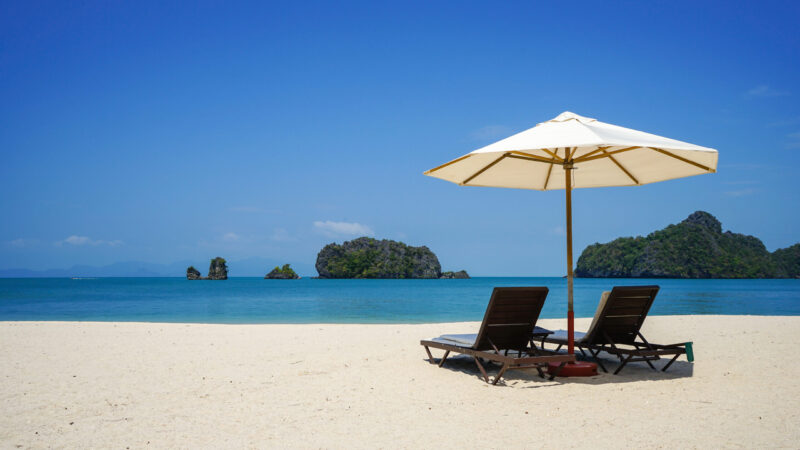
Globally, countries are still experiencing a decline in tourism expenditures. The United Nations World Tourism Organisation (UNWTO) World Tourism Barometer shows that the number of tourist arrivals recorded in 2020 was 399 million people compared to 1.47 billion people in 2019, a decrease of 74.0 per cent. 1
Domestic Tourism
Malaysia has not been exempted from this downward trend, as international borders remain partially closed. The Covid-19 pandemic resulted in a decrease of 83.4 per cent of inbound tourists in 2020. Tourist arrivals to Malaysia only came in at 4.3 million people compared to 26.1 million people in the previous year. 2
Nonetheless, Malaysia is among the countries with the highest percentage of fully vaccinated individuals in the world, with 98 per cent of the country’s adult population and over 78 per cent of the national population having completed their vaccination doses. This is expected to play a role in reviving the tourism industry as the willingness to travel increases. 3
Local tourism resumed shortly after the country ended its multiple lockdowns indicating that the demand for domestic travel will continue to grow and will recover relatively fast because of the growing in-country spending. Seasoned vacationers who are unable to travel abroad are diverting their money locally.
The disruption in demand caused overall internal tourism consumption in 2020 to plummet by 71.2 per cent compared to a growth of 6.8 per cent in the previous year. However, domestic tourism continues to play a significant role contributing 73.8 per cent to internal tourism consumption. 4
2022 a Turning Point for Inbound Tourism
According to the UNWTO Panel of Experts, 61 per cent of tourism professionals see better prospects for 2022. While 58 per cent expect a rebound in 2022, (mostly during the third quarter), only 42 per cent foresee a potential rebound in 2023. Most experts (64 per cent) now expect international arrivals to return to pre-pandemic levels in 2024 or later, up from 45 per cent in an earlier survey. 6
As domestic travel is keeping the Malaysian travel sector afloat, the industry needs to reinvent itself while waiting for international tourism to resume. Therefore, it is timely for the government to introduce new policies to revive the industry.
National Tourism Policy 2020-2030
In response, the Government launched the National Tourism Policy (NTP) 2020-2030 on 23 December 2020 to ensure the continuity of the country’s tourism industry, while targeting to make Malaysia a global top 10 tourism destination in both arrivals and receipts.
Key approaches in achieving the NTP’s agenda are harnessing public-private sector partnerships and embracing digitalisation to drive innovation and competitiveness towards sustainable and inclusive development in line with the Twelfth Malaysia Plan (12MP), National Ecotourism Plan 2.0 and the 17 United Nations Sustainable Development Goals (UNSDGs).
The policy would be implemented through six (6) main strategic thrusts, including the transformation of governance, creating an inclusive tourism investment zone, and intensifying digitisation in the tourism sector.
In addition, the core thrusts involve enriching tourists’ experience and satisfaction, strengthening commitment to sustainable tourism and increasing human capital capacity in all tourism sub-sectors. 7
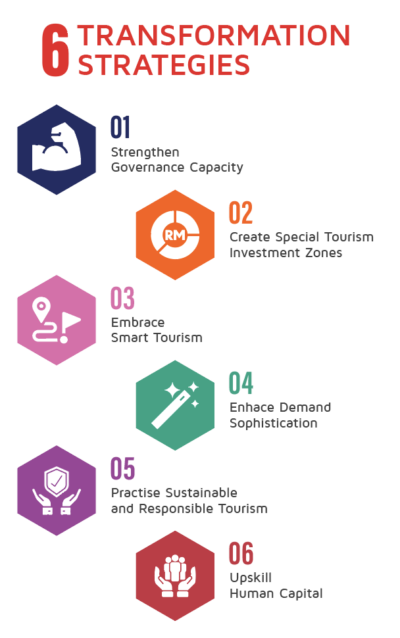
Special Tourism Investment Zone (STIZ)
To ensure that the strategic thrusts can be implemented objectively and effectively, six (6) sub-committees have been established. MIDA has been appointed to lead the Investment Sub-Committee.
One of the key objectives of the Jawatankuasa Kecil Pelaburan (JKP) is to develop Special Tourism Investment Zones (STIZ) through public-private partnerships and formulate strategies to attract local and international investors to STIZs which have been identified for the promotion of high-value tourism development. Currently, MIDA and the Ministry of Tourism, Arts and Culture Malaysia (MoTAC) are conducting roadshows to engage stakeholders and authorities throughout Malaysia in identifying potential STIZs.
Essentially, the STIZs aim to enhance Malaysia’s tourism ecosystem. Beyond offering accommodation facilities, other required facilities in STIZs include banking, commercial, logistics, hospitals, and retirement homes.
Public-private partnerships are crucial in transforming Malaysia’s tourism industry and the designation of STIZs will create a pro-investment environment while sending welcoming signals to international and homegrown investors.
The strategy of designating certain areas as special zones to induce private investments is not new and has been used by the Government before. This policy has been highly successful in increasing foreign direct investment, employment and industrial capacity in Malaysia’s manufacturing sector.
Likewise, STIZs will function similarly to existing special manufacturing zones, but focus specifically on the tourism sector. The introduction of STIZs aims to encourage high quality investment in Malaysia’s tourism sector, in line with the transformation strategies of the NTP.
Practising Sustainable and Responsible Tourism
Promoting Malaysia as the next ‘Top of the Mind Ecotourism Destination in the World’, NTP incorporates elements of the UNSDGs. 8 The UNSDGs are benchmarks for the sustainable growth of Malaysia’s tourism industry, tourism’s role in promoting inclusive development, and responsible consumption and practices. 9
In practising good governance, it is important to ensure a balance between development, protection and preservation of the country’s treasures including the environment, culture and heritage. 10 The involvement of the private sector in providing infrastructure and facilities without compromising Environmental, Social and Governance (ESG) concerns is important in developing STIZs.
In the long term, the tourism and hospitality sectors will need to look at structural changes that support the transition to low-carbon practices and sustainability. 11 Preparing for alignment with the UNSDG and ESG aspects will encourage hotel and tourism project operators to make more sustainable investments, particularly in clean or green technology.
Embracing Smart Tourism
The Government has pushed for the adoption of digitalisation and innovation among hospitality players to gain a better competitive edge. These include creating virtual experiences, providing flexible cancellation policies and rolling out campaigns that encourage advance trip planning or booking.
Under the NTP, MoTAC in close consultation with industry associations has formulated and implemented the Tourism Recovery Plan (TRP). Through the TRP, MoTAC aims to revitalise domestic tourism by offering more creative and attractive travel packages through digital platforms, as well as incentives and promotions in the form of rebate vouchers, e-vouchers, and cashback through e-wallets and discounts.
Another recovery strategy under the TRP is embracing technologies such as cashless payment, online booking, contactless transaction, and contactless check-in to deliver a secure, seamless and contactless travel experience for tourists in the post-pandemic era.
To support technology-related investments in this industry, MIDA encourages companies to tap onto the Automation Capital Allowance incentive which aims to promote the quick adoption of automation specifically for labour-intensive industries and to spur automation initiatives.
In achieving the objectives of NTP, MIDA welcomes quality investments that involve high value and innovative tourism products and services that align with Malaysia’s environmental policies and legal requirements. MIDA also encourages companies to invest in modern and higher standard infrastructure and facilities to build up the resilience and long term competitiveness of the tourism sector. This is in line with MIDA’s theme for this year, “Rebuilding a sustainable economy through quality investment and strategic investment supply chain development in 2022”.
For more information on the Automation Capital Allowance and other MIDA initiatives under NTP, contact MIDA’s Healthcare, Education and Hospitality Division.
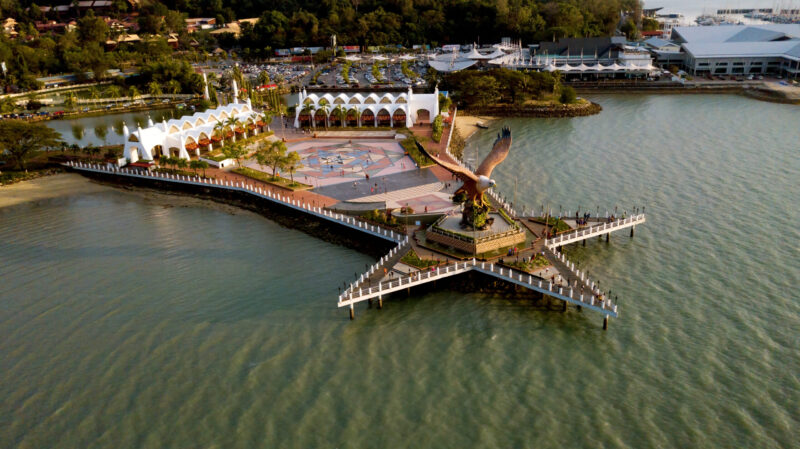
1&2 https://www.dosm.gov.my/v1/index.php/index.php?r=column/cthemeByCat&cat=111&bul_id=SXp2ZUF0TGx2OTU0YXo2YXZ1QUMydz09&menu_id=TE5CRUZCblh4ZTZMODZIbmk2aWRRQT09
3 https://www.theedgemarkets.com/article/nrc-proposes-reopening-malaysias-borders-early-march-without-compulsory-quarantine
4 https://www.dosm.gov.my/v1/index.php/index.phpr=column/cthemeByCat&cat=111&bul_id=SXp2ZUF0TGx2OTU0YXo2YXZ1QUMydz09&menu_id=TE5CRUZCblh4ZTZMODZIbmk2aWRRQT09
6 https://www.unwto.org/news/tourism-grows-4-in-2021-but-remains-far-below-pre-pandemic-levels
7 National Tourism Policy 2020-2030, Executive Summary
8 https://www.tourism.gov.my/media/view/tourism-malaysia-promotes-ecotourism-at-expo-2020-dubai#:~:text=Promoting%20Malaysia%20as%20the%20next,of%20sustainable%20and%20responsible%20tourism
9 National Tourism Policy2020-2030, Executive Summary
10 https://www.thestar.com.my/news/nation/2020/12/23/pm-covid-19-caused-over-rm100bil-in-tourism-losses
11 https://www.mida.gov.my/wp-content/uploads/2021/03/MIDA-IPR-2020_FINAL_March4.pdf
Explore other related content to further explore MIDA’s insights.

Tourism Law : Regulations, Responsibilities & Rights

Thursday, 21 February, 2019
12:30pm – 2:30pm Tourism Law : Regulations, Responsibilities & Rights ( Download pdf brochure )
Overview The tourism industry has become one of the most significant and fastest growing industries in the world. According to the United Nation World Tourism Organisation (UNWTO), international tourism generated USD 1.6 trillion in export earnings in 2017 and forecasted that by 2030, international tourist arrivals will reach 1.8 billion. In September 2018, the Tourism Ministry of Malaysia targeted about 28.1 million tourist arrivals in Malaysia in 2019 and 30 million in 2020. With this explosion in international tourism and the modernisation of the tourism industry, laws and regulations are ever more crucial to ensure successful businesses and happy travellers.
Talk Points : • Introduction to Tourism Law • Applicable Malaysian laws • Common Legal Issues when Travelling • Travel Agent’s Responsibilities • Tourist’s Rights and Remedies
- Richard Wee , Partner, Dispute Resolution, Head of Sports Law Practice Group and Head of Real Estate
- Marlysa Abdul Razak, Associate, Dispute Resolution Practice Group
Location : MahWengKwai & Associates, Level 10, Tower B, Prima Avenue, Dataran Prima.
Related Posts
- Sports Law Conference 2016
- SPORTS LAW: THE VAR
- Emerging Sports and Sports Law
- International Human Rights Day Charity Dinner
- Vessel #1 ; The “Lingo” of Shipping Law
- Share
- Tweet
- +1
- Pin it
– ↑ BACK TO TOP –

- International Solutions
- Social Responsibility
- Reviews & Testimonials
- Dispute Resolution
- Employment Law and Industrial Relations
- Individuals & Families
- Construction
- Foreign Direct Investment
- Real Estate
- Sports & Esports
- Corporate Advisory and Consultation Retainer
- Corporate Searches & Reports
- Criminal Defence Services
- Employment Law Consultation Retainer
- Joint Petition for Divorce
- NDA (Non-Disclosure Agreement)
- Power of Attorney
- Privacy Policy and Terms & Conditions of Use
- Senior Associates
- Pupil in Chambers
- Management & Support
- Articles & Updates
- MWKA eJournal
- MWKA eLegislation
- Legal Fees & Stamp Duty Calculator
- About our Talks
- Sign Up for Talks
- Upcoming & Past Talks
- Video Gallery
- Click to chat
- Request a callback
- Request for Proposal (RFP)
- Schedule a Meeting

MALAYSIA’S NATIONAL TOURISM POLICY: FOCUS ON RECOVERY, CONNECTIONS, AND SUSTAINABILITY

In late December 2020, the Prime Minister of Malaysia launched Malaysia’s National Tourism Policy 2020-2030, giving concrete direction for the future of Malaysia’s tourism industry over the next ten years.
In his speech, the Prime Minister emphasised the importance of recovery, connections, and sustainability. In the challenging period that we are facing right now and the limitations imposed upon us by the pandemic, these are the core actions we must all embrace, regardless of whatever industry we are in.
These three core ideas are emphasised further through the National Tourism Policy’s six transformational strategies namely:
- Strengthen governance
- Create special tourism investment zones
- Embrace smart tourism
- Enhance demand sophistication
- Practise sustainable and responsible tourism
- Upskill human capital
At Islamic Tourism Centre (ITC), we fully align with these concepts as well, understanding that we need to continue our efforts to revitalise the tourism sector with the best possible preparation. Insha Allah, our efforts now are to prepare for a time later when the availability of effective vaccines and the opening of borders can boost travel again.
To move us forward, ITC has embraced the philosophy of “New thinking, new actions, new results.” With this shift in perspective, we are more focused on engaging with key influencers, deepening our relations with industry players, and strengthening our ITC brand locally and internationally.
Under the National Tourism Policy, Muslim-friendly tourism has been given a priority as well with the aim of cementing Malaysia’s position as the global leader in an alternative and ethical form of tourism beyond rituals. Towards this end, ITC has been tasked to consolidate Malaysia’s position as the world’s top destination for Muslim-friendly travel by increasing the depth of Islamic hospitality.
ITC aspires to fulfil these goals through five key actions:
- Creating smart partnerships with related agencies to establish Malaysia as the global centre for Muslim-friendly hotel certification
- Positioning ITC as the leading repository of market intelligence and reference centre for Muslim-friendly tourism and hospitality
- Branding Malaysia as the top venue for Islamic contemporary lifestyle through conferences, fashion shows, art and calligraphy exhibitions, and gastronomy festivals
- Leveraging on Islamic principles as the foundation to raise the service quality of Muslim-friendly hotels
- Establishing smart partnerships between ITC and the Ministry of Health and the Malaysia Health Travel Council to turn Malaysia into a front-runner in Islamic healthcare and wellness.
Related Posts

MELAKA EXPLORES MUSLIM-FRIENDLY TOURISM POTENTIAL IN COLLABORATION WITH ISLAMIC TOURISM CENTRE (ITC)


ITC HEADS TO KAZAN TO ADVANCE MALAYSIA’S POSITION AS MUSLIM-FRIENDLY DESTINATION AND UMRAH HUB

ISLAMIC TOURISM CENTRE EMPOWERS INDUSTRY STAKEHOLDERS FOR GROWTH IN THE MUSLIM-FRIENDLY TOURISM AND HOSPITALITY SECTOR
Lost Your Password?
Reset Password
National Tourism Policy 2020 - 2030.
Security Alert May 17, 2024
Worldwide caution, update may 10, 2024, information for u.s. citizens in the middle east.
- Travel Advisories |
- Contact Us |
- MyTravelGov |
Find U.S. Embassies & Consulates
Travel.state.gov, congressional liaison, special issuance agency, u.s. passports, international travel, intercountry adoption, international parental child abduction, records and authentications, popular links, travel advisories, mytravelgov, stay connected, legal resources, legal information, info for u.s. law enforcement, replace or certify documents.
Before You Go
Learn About Your Destination
While Abroad
Emergencies
Share this page:
Travel Advisory July 24, 2023
Malaysia - level 1: exercise normal precautions.
Reissued with obsolete COVID-19 page links removed.
Exercise normal precautions in Malaysia. Some areas have increased risk. Read the entire Travel Advisory.
Exercise Increased Caution in:
- The eastern area of Sabah State due to kidnapping .
Read the country information page for additional information on travel to Malaysia.
If you decide to travel to Malaysia:
- Enroll in the Smart Traveler Enrollment Program ( STEP ) to receive Alerts and make it easier to locate you in an emergency.
- Follow the Department of State on Facebook and Twitter .
- Review the Country Security Report for Malaysia.
- Visit the CDC page for the latest Travel Health Information related to your travel.
- Prepare a contingency plan for emergency situations. Review the Traveler’s Checklist .
Eastern Area of Sabah State – Level 2: Exercise Increased Caution
There is a threat of kidnappings-for-ransom from both terrorist and criminal groups. These groups may attack with little to no warning, targeting coastal resorts, island resorts, and boats ferrying tourists to resort islands.
The U.S. government has limited ability to provide emergency services to U.S. citizens in eastern Sabah as U.S. government employees must obtain special authorization to travel to parts of eastern Sabah.
Embassy Messages
View Alerts and Messages Archive
Quick Facts
Six months beyond date of arrival
At least one blank page required for entry stamp
Not normally required for stays of less than 90 days.
$10,000 or equivalent
Embassies and Consulates
U.S. Embassy Kuala Lumpur
376 Jalan Tun Razak 50400, Kuala Lumpur Malaysia Telephone: +(60) (3) 2168-5000 Emergency After-Hours Telephone: +(60) (3) 2168-5000 (press 0 at the recording) Fax: +(60) (3) 2148-5801 Email: [email protected]
Destination Description
Learn about the U.S. relationship to countries around the world.
Entry, Exit and Visa Requirements
To enter Malaysia, your passport must be valid for at least six months beyond the date of your arrival in Malaysia. You must have at least one blank page for the entry stamp. Permission to enter and remain in Malaysia is under the authority of the Malaysian Immigration Department. Visit the websites of the Embassy of Malaysia in Washington D.C . and the Malaysian Immigration Department for more information.
Effective January 1, 2024, the Malaysian Immigration Department requires all travelers to complete the Malaysian Digital Arrival Card (MDAC) . Permanent residents of Malaysia, long term-pass holders, and diplomatic and official passport holders are exempt from this requirement.
For the latest information, travelers should review the Malaysian Immigration website . You can submit an online inquiry form or contact the Malaysian Government call center (MyGCC) at +60 3-8000-8000. If you are outside of Malaysia, you should contact the nearest Malaysian embassy or consulate if you have questions about Malaysian entry and exit requirements.
If you are planning onward travel after departing Malaysia, please note that many other countries in the region require at least six months’ remaining validity on your passport to enter.
You do not need a visa if you are coming for business or tourism for 90 days or less.
Immigration officials will place an entry stamp, known as a social visit pass (visa), in your passport authorizing a stay of up to 90 days. Travelers may apply to the Malaysian Immigration Department for extensions, which may or may not be granted. You must exit Malaysia using the same passport that you used to enter. If this passport is replaced for any reason before you depart Malaysia, you must apply with Immigration to obtain a “special pass” (exit permit) in your new passport prior to departing.
Neither the U.S. Government nor the U.S. Embassy in Kuala Lumpur can intervene on your behalf when you apply for a Malaysian visa, nor can we advocate for your admission into Malaysia if you are denied entry.
Travel Document : Persons traveling on a USCIS-issued Refugee Travel Document issued by the United States Citizenship and Immigration Services (USCIS) must apply for a visa prior to traveling to Malaysia.
Border Crossings: Follow all entry instructions, present your passports only to immigration officials, and be sure immigration officials stamp your passport with the correct date upon entering and exiting Malaysia. Lack of correct documentation or proof of entry into Malaysia may result in high fines and/or detention.
Sabah and Sarawak: The eastern states of Sabah and Sarawak (on the island of Borneo) maintain semi-autonomous immigration controls and may have additional have special entry requirements. You must have your passport to enter or exit Sabah or Sarawak, even when arriving from peninsular Malaysia on domestic flights.
Dual Nationality: Malaysia does not recognize or permit dual nationality. If Malaysian authorities learn that you are a U.S.-Malaysian dual national, they may require you to immediately forfeit your U.S. passport or your Malaysian citizenship. U.S.-Malaysian dual nationals should consider this issue seriously before traveling to Malaysia. See our dual nationality page for more information.
U.S.-Israeli Dual Nationals: The Malaysian government does not maintain diplomatic relations with Israel, and Immigration officials have denied entry to U.S.-Israeli dual nationals who have presented their Israeli passports to show exit stamps from their last destination point of departure. U.S.-Israeli dual nationals should use their U.S. passports to depart the last country on their itinerary prior to arriving in Malaysia.
Visa Overstays: Malaysian immigration authorities have exit controls at all official ports of departure and routinely fine and detain foreigners who overstay their social visit passes (visas). If you overstay your visa, you will not be allowed to exit Malaysia until you resolve the overstay with the Immigration Department of Malaysia.
Carry your passport (containing the Malaysian entry stamp) with you at all times in case authorities question your immigration status. Several U.S. citizens have been arrested during immigration sweeps based on inability to establish nationality and legal status in Malaysia. Detentions may last from a few hours to several weeks. Check your visa status periodically while in Malaysia and strictly follow immigration laws and regulations.
Visit the Embassy of Malaysia website for the most current visa information.
The U.S. Department of State is unaware of any HIV/AIDS entry restrictions for visitors to or foreign residents of Malaysia.
Find information on prevention of international child abduction and customs regulations on our website.
Safety and Security
Terrorism: Terrorist groups and those inspired by such organizations are intent on attacking U.S. citizens abroad. Terrorists are increasingly using less sophisticated methods of attack – including knives, firearms, and vehicles – to more effectively target crowds. Frequently, their aim is unprotected or vulnerable targets, such as:
- High-profile public events (sporting contests, political rallies, demonstrations, holiday events, celebratory gatherings, etc.)
- Hotels, clubs, and restaurants frequented by tourists
- Places of worship
- Shopping malls and markets
- Public transportation systems (including subways, buses, trains, and scheduled commercial flights)
Malaysia remains a transit point and, to a lesser extent, a destination country for members of terrorist groups including ISIS, Abu Sayyaf Group, al-Qa’ida, and Jemaah Islamiyah. Information from credible sources suggests that there is a continued risk of armed terrorist and criminal groups operating and planning attacks against foreigners, including U.S. citizens, in the East Asian and Pacific region, including Malaysia. Since 2013, Malaysian authorities have arrested more than 500 supporters of ISIS, including many individuals who planned to fight in Syria and Iraq.
Use caution in eastern Sabah because of the threat of kidnappings-for-ransom and violence from both terrorist and criminal groups, including the Philippines-based Abu Sayyaf Group (see the Philippines Travel Advisory for more information ). In addition to targeting coastal or resort islands themselves, criminal or terrorist groups may attempt to intercept boats ferrying tourists from the mainland to resort islands.
Due to safety concerns, U.S. government employees traveling for both personal and official travel to Sabah east of the north-south line drawn from the cities of Kudat to Tawau, including all islands, must obtain official written permission from the U.S. Embassy in Kuala Lumpur. The exceptions are the cities of Sandakan, Lahad Datu, Tawau, the Sepiloolik Nature Reserve, and the Kinabatangan River areas, which require U.S. government employees to officially notify the Embassy prior to travel.
Malaysian law enforcement officials have enacted land and water-based curfews in the coastal areas of eastern Sabah. Check local media or ask local police for the most recent curfew information if traveling to eastern Sabah.
For more information, see our Terrorism page.
Crime: Petty theft and violent crime in Kuala Lumpur continue to be concerns. Purse snatchings, pickpocketing, smash-and-grab thefts from vehicles, and residential burglaries are the most common crimes committed against both locals and foreigners. Avoid wrapping purse straps around arms or shoulders to avoid injury. Violent and more serious crimes are less common; however, in October 2022, following local media reports of an increase in violent crime in the area of 430-440 Jalan Tun Razak, which houses multiple bars, clubs, and restaurants, the Embassy has advised U.S. government employees visiting establishments in this general vicinity to depart the neighborhood no later than 9:00 pm.
Taxi drivers in central Kuala Lumpur have perpetrated violent crimes against foreign tourists and local residents. Use e-hailing services or book taxis in downtown shopping areas by phone or online, rather than hailing a taxi on the street, particularly after dark.
Criminals also target motorists stuck in traffic or stopped at a light with smash and grab robberies. Keep valuables out of sight while driving or remove them from the car (including from the trunk) when parked. GPS devices should not be left on the windshield or dashboard.
Demonstrations occur frequently. They may take place in response to political or economic issues, on politically significant holidays, and during international events.
- Demonstrations can be unpredictable, avoid areas around protests and demonstrations.
- Check local media for updates and traffic advisories.
Local law pertaining to peaceful assembly prohibits non-Malaysians from participating in public protests.
International Financial Scams: See the Department of State and the FBI pages for information.
Sophisticated internet romance and financial scams are prevalent in Malaysia. Scams are often initiated through Internet postings/profiles or, less frequently, by unsolicited emails, letters, text messages, and messages on social media. Scammers frequently pose as U.S. citizens who have no one else to turn to for help. Common scams include:
- Romance/Online dating
- Money transfers
- Lucrative sales
- Gold purchase
- Contracts with promises of large commissions
- Inheritance notices
- Work permits/job offers
- Bank overpayments
Victims of Crime: U.S. citizen victims of sexual assault are encouraged to contact the U.S. Embassy for assistance. Report crimes to the local police via the emergency line at 999 (landline) or 112 (cell/mobile). Alternatively, call the Royal Malaysia Police (RMP) Operations Center in Kuala Lumpur, 03-2115-9999 or 03-2266-2222 for advice on how to make a non-emergency police report. Contact the U.S. Embassy at +(60) (3) 2168-5000 for assistance. A police report is necessary for the Embassy to help victims follow up on incidents of crime. In some tourist areas, the police have established small "Tourist Police” stations manned by personnel familiar with helping visitors to Malaysia. Remember that local authorities are responsible for investigating and prosecuting a crime.
See our webpage on help for U.S. victims of crime overseas .
- Help you find appropriate medical care
- Assist you in reporting a crime to the police
- Contact relatives or friends with your written consent
- Provide general information regarding the victim’s role during the local investigation and following its conclusion
- Provide a list of local attorneys
- Provide our information on victim’s compensation programs in the U.S.
- Provide an emergency loan for repatriation to the United States and/or limited medical support in cases of destitution
- Help you find accommodation and arrange flights home
- Replace a stolen or lost passport
Domestic Violence: U.S. citizen victims of domestic violence are encouraged to contact the Embassy at +(60) (3) 2168-5000 for assistance. Victims of domestic violence, sexual assault, and child abuse may receive comprehensive care at the One Stop Crisis Centers (OSCC) located in all government hospitals. The OSCC provide survivors medical care, temporary shelter, legal aid, and counseling.
Tourism: The tourism industry is generally regulated and rules with regard to best practices and safety inspections are regularly enforced. Hazardous areas/activities are identified with appropriate signage and professional staff is typically on hand in support of organized activities. In the event of an injury, appropriate medical treatment is widely available throughout the country. Outside of a major metropolitan center, it may take more time for first responders and medical professionals to stabilize a patient and provide life-saving assistance, and first responder capabilities may vary. When participating in trekking or other activities in extremely remote areas, particularly in the eastern states of Sabah and Sarawak on the island of Borneo, it may be difficult for first responders to reach patients quickly.
U.S. citizens are encouraged to purchase medical evacuation insurance. See our webpage for more information on insurance providers for overseas coverage.
Local Laws & Special Circumstances
Criminal Penalties: You are subject to local laws. If you violate local laws, even unknowingly, you may be expelled, arrested, or imprisoned. Individuals establishing a business or practicing a profession that requires additional permits or licensing should seek information from the competent local authorities, prior to practicing or operating a business.
Penalties for using, possessing, or trafficking in illegal drugs in Malaysia are more severe than those in the United States, and convicted offenders can expect long jail sentences and heavy fines, or death.
It is illegal to take pictures of certain buildings such as military facilities, government buildings and offices, and Ministry of Health facilities including public hospitals and clinics.
Driving under the influence could land you immediately in jail.
Certain white-collar crimes are punishable by caning.
If you purchase or collect local plants or wildlife without authorization from the Malaysian government, you may be prosecuted and sentenced to heavy fines, expulsion and/or imprisonment.
It is illegal to distribute religious literature of another faith to Malaysian Muslims. Special religious authorities and local police occasionally conduct raids on popular nightspots and hotels to deter activities among local Muslims that contravene religious customs, including drinking alcohol and adultery.
Furthermore, some laws are also prosecutable in the United States, regardless of local law. For examples, see our website on crimes against minors abroad and the Department of Justice website.
Arrest Notification: If you are arrested or detained, ask the police or prison officials to notify the U.S. Embassy immediately. See our webpage for further information.
Counterfeit and Pirated Goods: Although counterfeit and pirated goods are prevalent in many countries, they may still be illegal according to local laws. You may also pay fines or have to give them up if you bring them back to the United States. See the U.S. Department of Justice website for more information.
Currency: Currency exchange and Western Union money transfers are readily available. Credit cards are accepted throughout the country, but you should be aware of the risk of fraud. If possible, ensure your credit card remains in your presence during every transaction. ATMs can be a safer means of obtaining Malaysian Ringgit. PINs in Malaysia are six digits long, and some travelers have reported having difficulty retrieving cash from ATMs using four-digit PINs.
Faith-Based Travelers: See the following webpages for details:
Faith-Based Travel Information
International Religious Freedom Report – see country reports
Human Rights Report – see country reports
Hajj Fact Sheet for Travelers
Best Practices for Volunteering Abroad
LGBTQI+ Travelers: Malaysia’s penal code criminalizes homosexual acts, termed “carnal intercourse against the order of nature,” leading to punishment of up to 20 years in prison and/or whipping, and police periodically raid LGBTQI+ frequented nightclubs and events. Foreign same-sex marriages or civil unions are not recognized as legally valid. Several states in Malaysia have instated Islamic Sharia laws, applying to male and female Muslims, criminalizing same-sex activity with up to three years imprisonment and whipping. Transgender individuals have been arrested and charged with "indecent behavior,” and received fines and prison sentences of up to three months. Transgender individuals may also be denied entry to Malaysia at the discretion of the Malaysian immigration authorities. LGBTQI+ individuals may face discrimination or even violence, especially in more conservative rural areas. See LGBTQI+ Travel Information page and section 6 of our Human Rights Report for further details.
Travelers With Disabilities: The law in Malaysia prohibits discrimination against persons with physical, sensory, intellectual or mental disabilities, but the law is not regularly enforced. Social acceptance of persons with disabilities in public is as prevalent as in the United States. The most common types of accessibility may include accessible government facilities, information, and communication/access to services. Expect accessibility to be limited in public transportation, older lodging, and older public infrastructure, and common in newer lodging, communication/information, and newer public infrastructure. Accessibility is more limited in rural areas.
Malaysia has an active civil society and NGO community focused on disability welfare and protection. They are usually able to provide information and assistance in employment services, assistive devices and equipment, chore services, companion-based services, day services, and support network for parents.
See our Travelers with Disabilities page.
Students: See our Students Abroad page and FBI travel tips .
Women Travelers: In cases of sexual assault, victims should go directly to the nearest major public hospital which will offer “one-stop” response including medical care and testing, forensic testing, access to the police to make a criminal report, legal assistance, counseling, and temporary shelter. See our travel tips for Women Travelers .
For emergency services in Malaysia, dial 999 (landline) or 112 (cell/mobile). Callers to 999 emergency number are directed to whichever government hospital the dispatcher chooses.
Ambulance services are:
- Widely available but training and availability of emergency responders may be below U.S. standards.
- Not equipped with state-of-the-art medical equipment.
- Injured or seriously ill travelers may prefer to take a taxi or private vehicle to the nearest major hospital rather than wait for an ambulance (45+min).
We do not pay medical bills. Be aware that U.S. Medicare/Medicaid does not apply overseas. Most hospitals and doctors overseas do not accept U.S. health insurance. Malaysian hospitals will not bill your insurance directly. You must provide payment and seek reimbursement.
Medical Insurance: Make sure your health insurance plan provides coverage overseas. Most care providers overseas only accept cash payments. See our webpage for more information on insurance providers for overseas coverage. Visit the U.S. Centers for Disease Control and Prevention for more information on type of insurance you should consider before you travel overseas.
We strongly recommend supplemental MEDEVAC insurance to cover medical evacuation.
Always carry your prescription medication in original packaging with your doctor’s prescription. Check with the Royal Malaysian Customs Department to ensure the medication is legal in Malaysia.
Vaccinations: Be up-to-date on all vaccinations recommended by the U.S. Centers for Disease Control and Prevention (CDC).
Further health information:
- World Health Organization
- U.S. Centers for Disease Control and Prevention (CDC)
Air Quality: Visit AirNow Department of State for information on air quality at U.S. Embassies and Consulates.
The air quality varies considerably and fluctuates with the seasons. It is typically at its worst in the dry season from July to October due to large agricultural fires in the region. People at the greatest risk from particle pollution exposure include:
- Infants, children, and teens
- People over 65 years of age
- People with lung disease such as asthma and chronic obstructive pulmonary disease (COPD), which includes chronic bronchitis and emphysema;
- People with heart disease or diabetes
- People who work or are active outdoors
The U.S. Embassy maintains a list of doctors and hospitals . We do not endorse or recommend any specific medical provider or clinic.
Medical Facilities and Services:
- Adequate health facilities are available throughout the country but health care in rural areas may be below U.S. standards.
- Private hospitals usually require advance payment before admitting a patient.
- Medical staff in rural areas may speak little English.
- Generally, in public hospitals only minimal staff is available overnight in non-emergency wards. Consider hiring a private nurse or having family spend the night with the patient, especially a minor child.
- Psychological and psychiatric services are limited, even in the larger cities, with hospital-based care typically only available through government institutions.
Medical Tourism and Elective Surgery
- Medical tourism is a rapidly growing industry. People seeking health care overseas should understand that medical systems operate differently from those in the United States and are not subject to the same rules and regulations. Anyone interested in traveling for medical purposes should consult with their local physician before traveling and visit the U.S. Centers for Disease Control and Prevention website for more information on Medical Tourism.
- Visit the U.S. Centers for Disease Control and Prevention website for information on Medical Tourism, the risks of medical tourism, and what you can do to prepare before traveling to Malaysia.
- We strongly recommend supplemental MEDEVAC insurance to cover medical evacuation in the event of unforeseen medical complications.
- Your legal options in case of malpractice are very limited in Malaysia.
- Although Malaysia has many elective/cosmetic surgery facilities that are on par with those found in the United States, the quality of care varies widely. If you plan to undergo surgery in Malaysia, make sure that emergency medical facilities are available and professionals are accredited and qualified.
Pharmaceuticals
- Exercise caution when purchasing medication overseas. Pharmaceuticals, both over the counter and requiring prescription in the United States, are often readily available for purchase with little controls. Counterfeit medication is common and may prove to be ineffective, the wrong strength, or contain dangerous ingredients. Medication should be purchased in consultation with a medical professional and from reputable establishments.
- U.S. Customs and Border Protection and the Food and Drug Administration are responsible for rules governing the transport of medication back to the United States. Medication purchased abroad must meet their requirements to be legally brought back into the United States. Medication should be for personal use and must be approved for usage in the United States. Please visit the U.S. Customs and Border Protection and the Food and Drug Administration websites for more information.
Assisted Reproductive Technology and Surrogacy
- If you are considering traveling to Malaysia to have a child through use of assisted reproductive technology (ART) or surrogacy, please see our ART and Surrogacy Abroad page .
- Although surrogacy agencies/clinics claim surrogacy is legal in Malaysia, there is no legal framework for foreigners or same-sex couples to pursue surrogacy in Malaysia. As a result, surrogacy agreements between foreign or same-sex intending parents and gestational mothers are not enforced by Malaysia courts.
- If you decide to pursue parenthood in Malaysia via assisted reproductive technology (ART) with a gestational mother, be prepared for long and unexpected delays in documenting your child’s citizenship. Be aware that individuals who attempt to circumvent local law risk criminal prosecution.
Water Quality
- In many areas, tap water is not potable. Bottled water and beverages are generally safe, although you should be aware that many restaurants and hotels serve tap water unless bottled water is specifically requested. Be aware that ice for drinks may be made using tap water.
Adventure Travel
- Visit the U.S. Centers for Disease Control and Prevention website for more information about Adventure Travel .
General Health Language
The following diseases are prevalent:
- Chikungunya
- Leptospirosis
- Use the U.S. Centers for Disease Control and Prevention recommended mosquito repellents and sleep under insecticide-impregnated mosquito nets. Chemoprophylaxis is recommended for all travelers even for short stays.
- Visit the U.S. Centers for Disease Control and Prevention website for more information about Resources for Travelers regarding specific issues in Malaysia.
Travel and Transportation
Road Conditions and Safety: Road safety is a very serious safety concern. Prior to the COVID-19 pandemic, Malaysia averagesd approximately 2219 traffic fatalities a day, placing it among the top 1020 most dangerous countries in which to operate a vehicle worldwide. Undisciplined motorcycle and motor scooter operators are the principal cause of traffic accidents and constitute nearly two-thirds of all traffic fatalities. Motorcyclists tend not to obey traffic laws and often travel without regard for their safety or that of other motorists. As such, use turn signals well in advance of turning to alert motorcycles.
Bottlenecks are common in major cities because road building has not kept pace with the spread of motorized vehicles. Multi-lane highways often merge into narrow two-lane roads in the center of town and cause congestion. Many streets are narrow and winding. Traffic is heavy during the morning and afternoon rush hours and slows down considerably when it rains. Monsoonal rains can quickly flood roads located in low-lying areas.
Traffic Laws: Traffic in Malaysia moves on the left side of the road, and most vehicles are right-hand drive. By law, you must use your front and back seat belts and must not use your cell phone while driving unless it is hands-free (e.g., Bluetooth). Turning left at a red light is not legal unless otherwise marked. Carry your passport or Malaysian identification card at all times when driving.
If you are involved in a traffic accident:
- Call the police immediately. Depending on the severity of the accident, you should call either the emergency number 999 (or 112 from a mobile phone) or the Royal Malaysia Police Operations Center in Kuala Lumpur, 03-2115-9999 or 03-2266-2222.
- Stay in your car and wait for the police to arrive before exchanging information with other parties involved in the accident.
Reports of road rage incidents, especially after midnight, are rising. Avoid confrontational behavior if you are involved in an accident. If you are threatened, stay in your car and lock the doors. If able, lleave the scene and file a report with the local police within 24 hours.
Sobriety Checkpoints: Laws against drinking and driving are strictly enforced and carry serious penalties. Police operate sobriety checkpoints in many entertainment districts frequented by expatriates. At these checkpoints, all drivers must submit to alcohol breath tests. If you fail a breath test, you will be arrested.
Driver’s License Requirements: International Driving Permits (IDP) may be used in conjunction with a valid U.S. license. The IDP must be obtained outside of Malaysia. If your IDP or U.S. license has expired, you will need to obtain a local driver’s license. Some classifications of visa holders may also be eligible for driver’s license “conversion,” a quicker process to obtain a local license. For additional information on this process, please contact the Malaysian Ministry of Transportation directly. The Ministry of Transportation recommends contacting a local driving school to arrange the paperwork. In order to obtain a local license, you will also need a valid long-term visa or work permit.
Many car rental agencies in Malaysia are willing to rent vehicles for a short term to U.S. citizens with valid U.S. driver’s licenses. Nevertheless, if you plan to drive in Malaysia, obtain an IDP before leaving the United States. More information on how to obtain an IDP is available on the Driving Abroad section of the Department of State website.
Public Transportation: There have been fatal and other serious accidents involving long-distance tour buses in Malaysia, particularly at night or in adverse weather conditions. If you plan to travel by bus, choose a reputable company, and avoid overnight routes.
Taxis are metered, but many drivers refuse to use the meter and instead charge a much higher rate, particularly during peak hours, when it is raining or when the passenger’s destination is to or through a heavily congested area. By regulation, metered fares increase by 50 percent between midnight and 6:00 a.m.; meters are programmed to display the higher fee automatically during these hours. Many individuals prefer to book taxi and car services through widely-used smart phone apps both for convenience and fare transparency.
See our Road Safety page for more information.
Aviation Safety Oversight: The U.S. Federal Aviation Administration (FAA) has assessed the government of Malaysia’s Civil Aviation Authority as not being in compliance with International Civil Aviation Organization (ICAO) aviation safety standards for oversight of Malaysia’s air carrier operations. Further information may be found on the FAA’s safety assessment page .
Maritime Travel: Mariners planning travel to Malaysia should also check for U.S. maritime advisories and alerts . Information may also be posted to the U.S. Coast Guard homeport website , and the NGA broadcast warnings .
For additional travel information
- Enroll in the Smart Traveler Enrollment Program (STEP) to receive security messages and make it easier to locate you in an emergency.
- Call us in Washington, D.C. at 1-888-407-4747 (toll-free in the United States and Canada) or 1-202-501-4444 (from all other countries) from 8:00 a.m. to 8:00 p.m., Eastern Standard Time, Monday through Friday (except U.S. federal holidays).
- See the State Department’s travel website for the Worldwide Caution and Travel Advisories .
- Follow us on Twitter and Facebook .
- See traveling safely abroad for useful travel tips.
Review information about Review information about International Parental Child Abduction in Malaysia . For additional IPCA-related information, please see the International Child Abduction Prevention and Return Act ( ICAPRA ) report.
Travel Advisory Levels
Assistance for u.s. citizens, malaysia map, learn about your destination, enroll in step.

Subscribe to get up-to-date safety and security information and help us reach you in an emergency abroad.
Recommended Web Browsers: Microsoft Edge or Google Chrome.
Check passport expiration dates carefully for all travelers! Children’s passports are issued for 5 years, adult passports for 10 years.
Afghanistan
Antigua and Barbuda
Bonaire, Sint Eustatius, and Saba
Bosnia and Herzegovina
British Virgin Islands
Burkina Faso
Burma (Myanmar)
Cayman Islands
Central African Republic
Cote d Ivoire
Curaçao
Czech Republic
Democratic Republic of the Congo
Dominican Republic
El Salvador
Equatorial Guinea
Eswatini (Swaziland)
Falkland Islands
France (includes Monaco)
French Guiana
French Polynesia
French West Indies
Guadeloupe, Martinique, Saint Martin, and Saint Barthélemy (French West Indies)
Guinea-Bissau
Isle of Man
Israel, The West Bank and Gaza
Liechtenstein
Marshall Islands
Netherlands
New Caledonia
New Zealand
North Korea (Democratic People's Republic of Korea)
Papua New Guinea
Philippines
Republic of North Macedonia
Republic of the Congo
Saint Kitts and Nevis
Saint Lucia
Saint Vincent and the Grenadines
Sao Tome and Principe
Saudi Arabia
Sierra Leone
Sint Maarten
Solomon Islands
South Africa
South Korea
South Sudan
Switzerland
The Bahamas
Timor-Leste
Trinidad and Tobago
Turkmenistan
Turks and Caicos Islands
United Arab Emirates
United Kingdom
Vatican City (Holy See)
External Link
You are about to leave travel.state.gov for an external website that is not maintained by the U.S. Department of State.
Links to external websites are provided as a convenience and should not be construed as an endorsement by the U.S. Department of State of the views or products contained therein. If you wish to remain on travel.state.gov, click the "cancel" message.
You are about to visit:

Tourism & Hospitality Law

Minimum Wages and Service Charge
Summary Of The Federal Court Case Of Crystal Crown Hotel & Resort Sdn Bhd v Kesatuan Kebangsaan Pekerja-Pekerja Hotel, Bar & Restoran Semenanjung Malaysia Written by Marlysa Razak and Athirah Jaafar This case had determined the standing…

Contracts in the Hospitality Industry
Written by Marlysa Razak and Brenda Tan Introduction In the beginning of 2021, the travel industry and community renewed their hopes and dreams that travelling would soon be possible again, especially with the introduction of vaccines for…

RWC Web Report: Marlysa Razak’s Lecture on Company, Employment and Contract Law in the Hospitality Industry at the Beacon International College, Singapore
By Brenda Tan On the 23rd of February 2021, RWC’s Partner, Marlysa Razak was invited by Beacon International College, Singapore to give a lecture on the impact of company, employment and contract law on business decision making…

OVERVIEW OF IATA TRAVEL PASS
Written by Marlysa Razak and Wong Shuang Jie Introduction In recent times of pandemic, there have been restrictions or even complete halt on international aviation. Despite there are countries that do allow for necessary travels, there are…

RWC COMMUNITY SERIES WEBINAR ON “TRAIN WITHOUT TRACK – A DISCUSSION ON AUTOMATED RAPID TRANSIT (ART)
Written by Jeremy Ling Introduction On the 19th of February 2021, RWC conducted a Webinar titled “Train without track – A Discussion on Automated Rapid Transit (ART) concurrently via Zoom and Facebook live. This discussion falls…

Short-Term Rentals: Power to enact House Rules as decided in the case of Verve Suites Mont’ Kiara Management Corporation
Written by Marlysa Razak and Wong Zi Ying This article is related to our previous article entitled “Should Short-Term Rental Accommodation be regulated?” published on Richard Wee Chambers’ website. “The passing of the house rules is not…
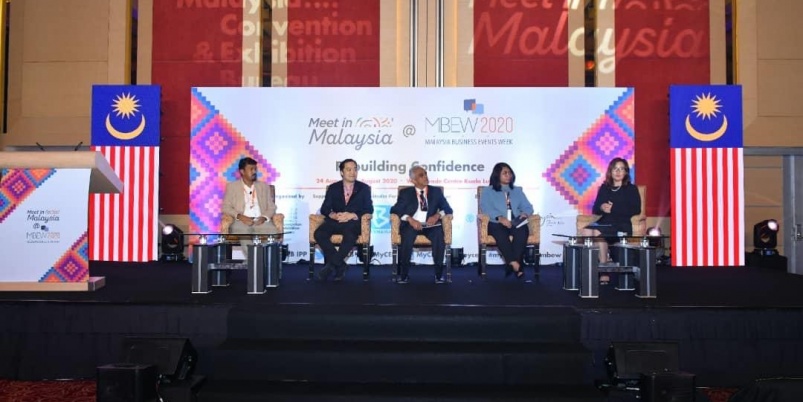
RWC WEBREPORT : Marlysa speaks at the “Meet In Malaysia”, Malaysia Business Events Week 2020 (MBEW)
RWC WEBREPORT : Reported by Ashley Yip On 24th August 2020, Marlysa Razak, RWC Partner, was invited to speak at the Malaysia Business Events Week 2020 (MBEW). Organized by the Malaysia International Trade and Exhibition…
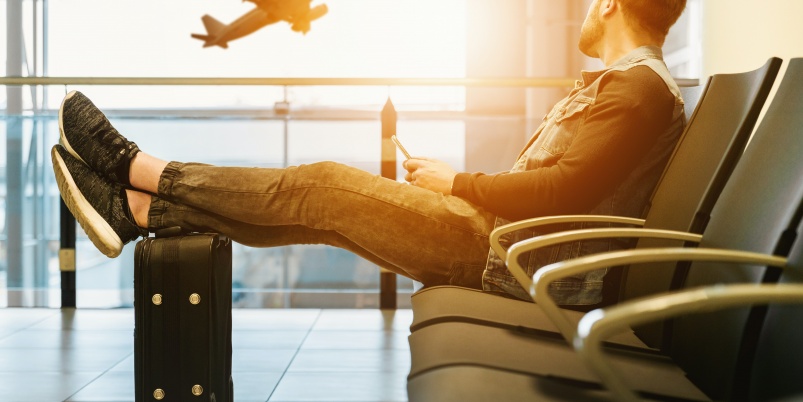
Travel Bubble
Written by Marlysa Razak and Ian Phua Introduction The Covid-19 pandemic has become the main concern across the globe. As a result, the governments of respected countries have no choice but to declare lockdowns and…

Hotel’s Bad Service – Can I Check-Out Early and Can I Get a Refund? Tourism & Hospitality Laws
Written by Marlysa Razak and Daniel Tan Introduction In July 2020, a twitter user posted that she and her friends, allegedly, had to clean up their hotel room and change all the sleeping covers themselves when they…

RWC Impact Series: Impact Of Covid19 Pandemic On The Stakeholder Of The Tourism Industries
Reported by Divagar Kaveri Despite the impact of Covid19 pandemic, on 10 April 2020, Richard Wee Chambers(RWC) has organised a webinar on the “Impact of Covid19 Pandemic on the stakeholder of the tourism industries”. A…

RECENTLY PUBLISHED
Popular articles.
- e-Invoicing in Malaysia: A Complete Guide For Your Business
- Malaysia e-Invoicing FAQs: Everything You Need to Know
- Important Terms in Malaysia e-Invoicing
- Reasons for Rejection and Cancellation of e-Invoice in Malaysia
- e-Invoice Exemptions in Malaysia: A Comprehensive Guide
- e-invoice Model in Malaysia: Benefits, Requirements and How to Get Started
- Data Security and Privacy Monitoring in Malaysia: How IRBM Leads the Way
- Transaction Types of e-Invoicing in Malaysia: A Comprehensive Guide
- Steps for submission, validation, and issuance of e-invoices in Malaysia
Malaysia Tourism Tax: What You Need to Know in 2024
Updated on : May 2nd, 2024
The Malaysian Tourism Tax Bill was passed in the Senate on 27 April 2017 and t he TTx has been in effect since 1 September 2017. All accommodation providers have to collect TTx from tourists staying at their premises. The tax at a rate of MYR10 per room, per night has been required to be collected by the accommodation operator and then paid to the Royal Malaysian Customs Department (RMCD).
The ambit of the law has been significantly widened under the new amendments which were effective from Jan 1, 2023 and now any digital platform whether located in Malaysia or outside Malaysia, on providing services relating to online booking of accommodation in Malaysia shall be liable to be registered for Tourism Tax in Malaysia.
What is the Tourism Tax in Malaysia?
The Tourism Tax in Malaysia, also known as TTx, is a tax charged for all foreign passport holders staying at accommodation premises in Malaysia. It is collected by the operators of these premises and is charged at a fixed rate of RM10.00 per room per night.
Malaysian nationals and permanent residents are excluded from the tax
Who is responsible for collecting and remitting tourism tax in Malaysia?
As per the policy update issued by the Malaysian government, the responsibility for charging, collecting, accounting, and remitting tourism lies on Digital Platform Service Providers (DPSPs) like Agoda and Booking.com for all online bookings, irrespective of whether the DPSP or the hotel operator receives the payment.
The hotel operators are liable to collect and remit TTx only for offline bookings
However, the policy has granted a grace period from 1 April 2023 TO 31 December 2025. During the grace period, the policy eases the compliance burden on DPSPs based on the booking and payment nature. Here's how it works:
- If a booking is made online, but payment goes directly to the hotel operator: The responsibility for collecting and remitting TTx falls on the operator.
- If both booking and payment are done online through the DPSP: Only, then does the responsibility to collect and remit tourism tax lie with the DPSP.
Who has to pay Tourism Tax?
The tourism tax is a consumption-based tax. Foreign tourists staying at accommodation premises in Malaysia are ultimately liable to bear the burden of Tourism tax in Malaysia. However, it is collected by the accommodation operation or digital platform service provider (DPSP) and remitted to the government on behalf of the tourist.
How to Pay?
- Tourists, upon payment to DPSPs (Digital Platform Service Providers) submit proof of TTx payment. In cases where proof is provided, registered operators are relieved from collecting TTx directly from tourists. However, if tourists fail to provide proof, DPSPs must collect the TTx amount and account for it to the RMCD.
- From 2023, DPSPs that facilitate the online booking of accommodations in Malaysia (“online travel platform operators e.g. Airbnb, OYO, etc.”) to collect tourism tax (TTx) and remit the tax to the RMCD.
- The deposit of Tourism tax in Malaysia is completely digital using their customer website MyTTx.
Key Highlights:
- MyTTx is an online submission and payment system for tourism tax (TTx).
- It is available 24 hours daily and accessible anywhere.
- The system can be accessed through any latest browser and is best viewed at 1024 x 768 resolution or higher.
When to Pay?
- Operators have to file a return every three months to account for the tourism tax (“TTX”) received. Note: If the operator is GST registered, the operator must file a tourism tax return in the same taxable period in which the operator files his/her GST returns (i.e. monthly or quarterly).
- The deadline to make payments of tax is clarified by stating that payment is due “not later than” the last day of the month following the end of each taxable period.
Benefits of Malaysian Tourism Tax
Tourism Tax comes with several advantages that contribute to the sustainable development of the tourism industry and the overall growth of local economy.
- Revenue Generation: The primary purpose of the Tourism Tax is to generate revenue for the Government to develop and enhance tourism-related infrastructure and services. This includes the development of tourist attractions, accommodation facilities, transportation networks, and other amenities that enhance the overall visitor experience.
- Promotion of Tourism: The funds from the Tourism Tax can be allocated to marketing and promotional activities aimed at attracting more tourists to Malaysia. This helps in boosting the country's image as a desirable tourist destination on a global scale.
- Cultural Preservation: Tourism Tax revenue can be invested in projects aimed at preserving and promoting Malaysia's rich cultural heritage. This may involve the restoration of historical sites, supporting traditional arts and crafts, and organizing cultural events that showcase the country's diverse cultural tapestry.
- Job Creation: A thriving tourism industry leads to increased demand for services, creating job opportunities across various sectors. The revenue generated from the Tourism Tax indirectly contributes to employment generation, benefiting local communities and individuals.
- Balance Over Tourism: The tax is becoming popular as a tool to battle the pressing issue of over-tourism in countries where both, indigenous nature and culture is at risk. It allows the government to monitor and manage the tourism sector effectively, ensuring compliance with standards and regulations set to maintain the industry's integrity.
TTx is here to stay
As Malaysia continues to position itself as a premier tourist destination, the Tourism Tax plays a pivotal role in sustaining its ecosystem. Navigating TTx is a necessity for a primarily tourist driver economy. It needs involvement of all stakeholders DPSPs, tourists, and the RMCD to make the system better and smoother every day.
Tourism Industry Act 1992
CommonLII: Copyright Policy | Disclaimers | Privacy Policy | Feedback URL: http://www.commonlii.org/my/legis/consol_act/tia1992251

COMMENTS
Because Malaysia is predominantly Muslim, the country follows Sharia law in most cases (Sharia law is a separate law altogether from the Malaysian legal system). Though Sharia law primarily applies to Muslims, the laws regarding everything LGBTQ apply to everyone, even western tourists.
Introduction to Tourism & Hospitality Law. By Marlysa Razak and Chang Wai Leng. Tourism is a multi-billion dollar industry and Malaysia generated a huge sum of income from tourism. According to the New Straits Times, in the year 2018, tourism generated an income of approximately RM84.1 billion to the Malaysian economy. The industry covers areas ...
Tourism Industry 7 LAWS OF MALAYSIA Act 482 TOURISM INDUSTRY ACT 1992 An Act to provide for the licensing and regulation of tourism enterprises and for matters incidental thereto or connected therewith. [1 May 1992, P.U. (B) 199/1992] BE IT ENACTED by the Seri Paduka Baginda Yang di-Pertuan Agong with the advice and consent of the Dewan Negara and
National Tourism Policy 2020-2030 In response, the Government launched the National Tourism Policy (NTP) 2020-2030 on 23 December 2020 to ensure the continuity of the country's tourism industry, while targeting to make Malaysia a global top 10 tourism destination in both arrivals and receipts.
Contact Us Ministry of Tourism, Arts and Culture No. 2, Tower 1, Jalan P5/6 Presint 5, 62200 PUTRAJAYA 03 8000 8000 03 8891 7100 [email protected]
4 Laws of MalaysiaACTA1633 New section 1a. 2. The Tourism Tax Act 2017 [Act 791], which is referred to as the "principal Act" in this Act, is amended by inserting after section 1 the following section: "Territorial and extra-territorial application 1a. (1)This Act and its subsidiary legislation shall apply both within and outside Malaysia.
In September 2018, the Tourism Ministry of Malaysia targeted about 28.1 million tourist arrivals in Malaysia in 2019 and 30 million in 2020. With this explosion in international tourism and the modernisation of the tourism industry, laws and regulations are ever more crucial to ensure successful businesses and happy travellers.
In late December 2020, the Prime Minister of Malaysia launched Malaysia's National Tourism Policy 2020-2030, giving concrete direction for the future of Malaysia's tourism industry over the next ten years. In his speech, the Prime Minister emphasised the importance of recovery, connections, and s
24 Laws of MalaysiaACT791 Recovery of tourism tax, etc., as civil debt 29. (1) Without prejudice to any other remedy, any tourism tax due and payable, and any penalty, surcharge or any other money payable, by an operator under this Act may be recovered as a civil debt due to the Government.
National Tourism Policy 2020-2030. Executive Summary - National Tourism Policy 2020-2030. Download. 23-12-20 | 5.02 MB. Ministry of Tourism, Arts and Culture Official Portal, MOTAC, Tourism, Arts, Culture.
Abstract. This Tourism Policy is a 10-year nationwide sectoral document aiming at encouraging a transformation in the agenda of Malaysia to drive the country towards a more competitive tourism industry that increases revenue, secures partnerships and investments, empowers local communities, and ensures the sustainability and resilience of the ...
An Act to establish the Malaysia Tourism Promotion Board and to provide for matters connected therewith. 1. (1) This Act may be cited as the Malaysia Tourism Promotion Board Act 1992. (2) This Act shall come into force on such date as the Minister may, by notification in the Gazette, appoint.
The Tourist Development Corporation of Malaysia (TDC) was established on 10 August 1972 as an agency under the former Ministry of Trade and Industry by an Act of Parliament. With the inception of the Ministry of Culture, Arts and Tourism on 20 May 1987, TDC was moved to this new ministry; and became the Malaysia Tourism Promotion Board (MTPB ...
Tourism: The tourism industry is generally regulated and rules with regard to best practices and safety inspections are regularly enforced. Hazardous areas/activities are identified with appropriate signage and professional staff is typically on hand in support of organized activities. ... Traffic Laws: Traffic in Malaysia moves on the left ...
RWC Impact Series: Impact Of Covid19 Pandemic On The Stakeholder Of The Tourism Industries. Reported by Divagar Kaveri Despite the impact of Covid19 pandemic, on 10 April 2020, Richard Wee Chambers (RWC) has organised a webinar on the "Impact of Covid19 Pandemic on the stakeholder of the tourism industries". A….
Tourism Industry (Amendment) 3 An Act to amend the Tourism Industry Act 1992. [ ] ENACTED by the Parliament of Malaysia as follows: Short title and commencement 1. (1) This Act may be cited as the Tourism Industry (Amendment) Act 2018. (2)This Act comes into operation on a date to be appointed by the Minister by notification in the Gazette.
The Tourism Tax in Malaysia, also known as TTx, is a tax charged for all foreign passport holders staying at accommodation premises in Malaysia. It is collected by the operators of these premises and is charged at a fixed rate of RM10.00 per room per night. Malaysian nationals and permanent residents are excluded from the tax.
Tourism Industry Act 1992 (Act 482) And Regulations & Malaysia Tourism Promotion Board Act 1992 (Act 481) : (as at 20th june 2013) Bibliographic Details; Corporate Authors: Malaysia, Lembaga Penyelidikan Undang-Undang: Published: Petaling Jaya: International Law Book Services, 2013. Subjects: Tourism --> Law and legislation --> Malaysia. Holdings;
Cataloging-in-Publication Data. Hanis Aliaa Ramley HOSPITALITY LAW HANDBOOK: Designed for tourism & hospitality students. VOLUME 1/ HANIS ALIAA RAMLEY, WAN NOR HAFIZA WAN SULAIMAN, RUHANA WATI IRAN. Mode of access: Internet. eISBN 978-967-2241-85-. Hospitality industry - Law and legislation. Law - Malaysia. Government publications.
33. (1) Where a licensed tourism enterprise has lost its licence, it shall immediately notify the Commissioner in writing of the loss. 26 Laws of Malaysia ACT 482. (2) Where a licensed tourist guide has lost his licence or his authorization card, he shall immediately notify the Commissioner in writing of the loss.
Batu Caves, a popular tourist attraction in Selangor. Tourism in Malaysia is a major industry and contributor to the Malaysian economy. Malaysia was once ranked 9th in the world for tourist arrivals. The Travel and Tourism Competitiveness Report 2017 ranks Malaysia 25th out of 141 countries overall. In an effort to diversify the economy and make Malaysia's economy less dependent on exports ...
Malaysia Tourism Promotion Board 5 LAWS OF MALAYSIA Act 481 MALAYSIA TOURISM PROMOTION BOARD ACT 1992 An Act to establish the Malaysia Tourism Promotion Board and to provide for matters connected therewith. [1 May 1992; P.U. (B) 198/1992] BE IT ENACTED by the Seri Paduka Baginda Yang di-Pertuan Agong with the advice and consent of the Dewan ...
Ministry of Tourism, Arts and Culture Official Portal, MOTAC, Tourism, Arts, Culture ... Malaysia Tourism Quality Assurance (MyTQA) Watchlist of Entities Violating the Tourism Industry Act 1992; Home; Staff Directory; Legal Unit; Legal Unit. Level 15, No. 2, Tower 1, Jalan P5/6 Presint 5